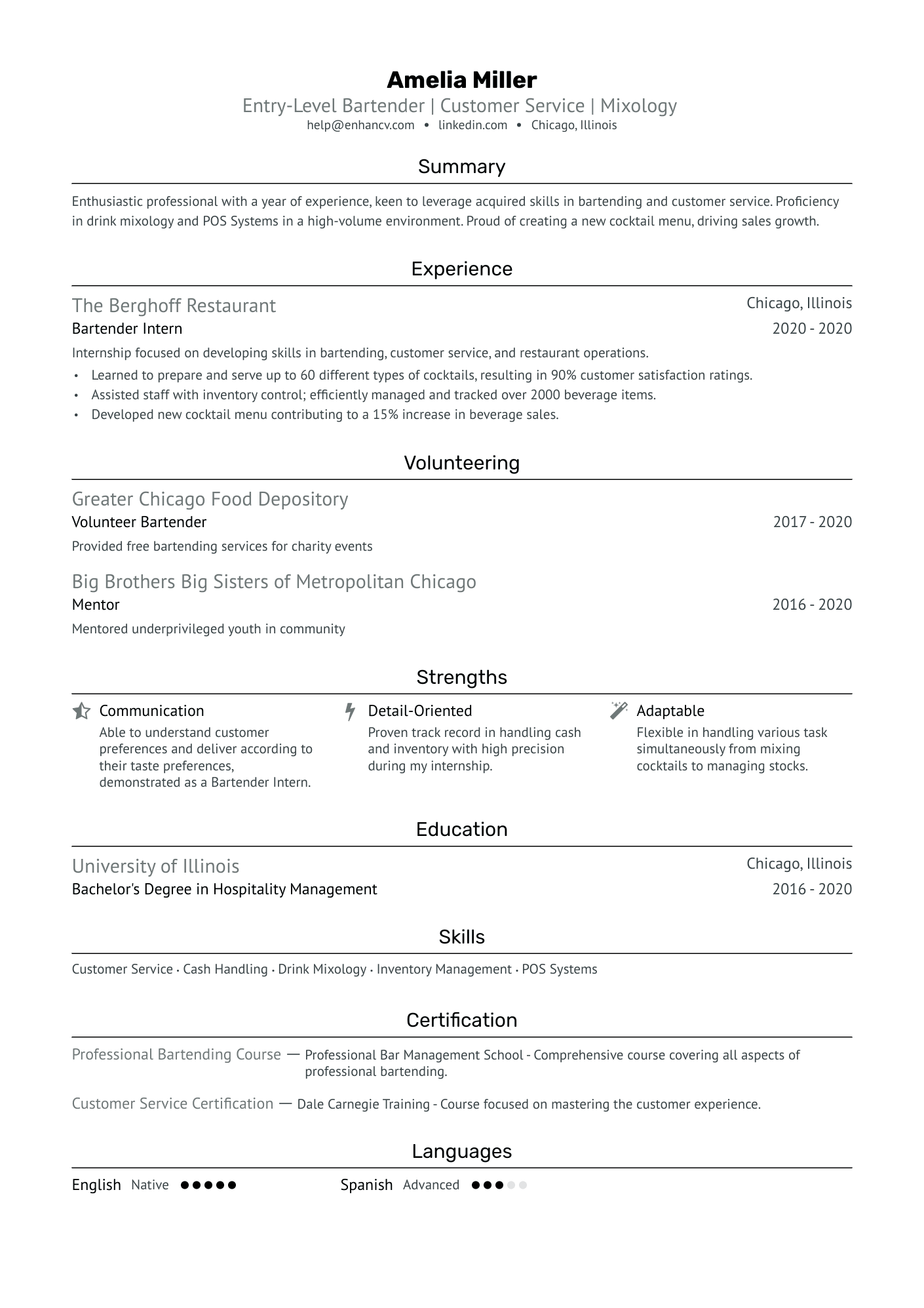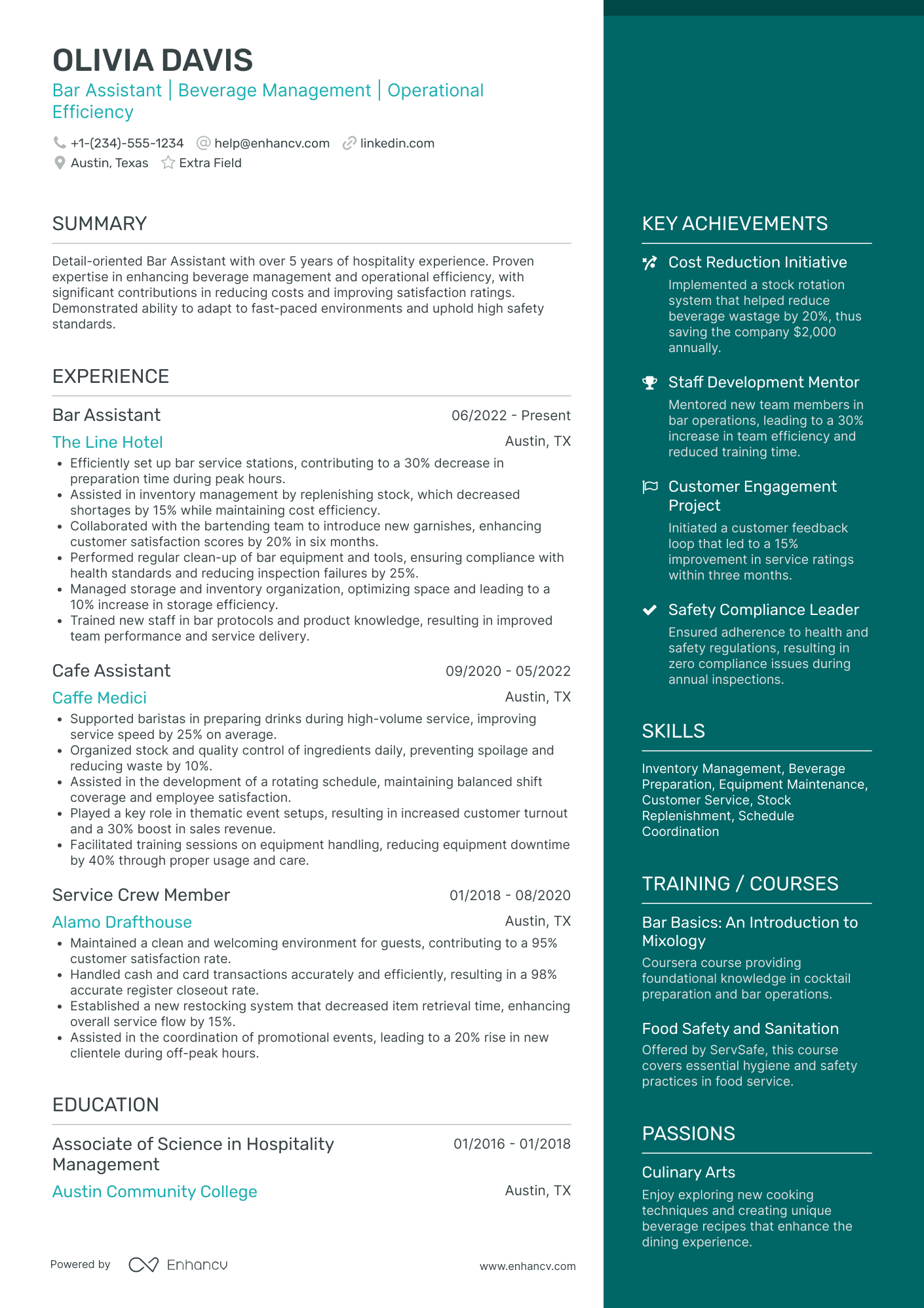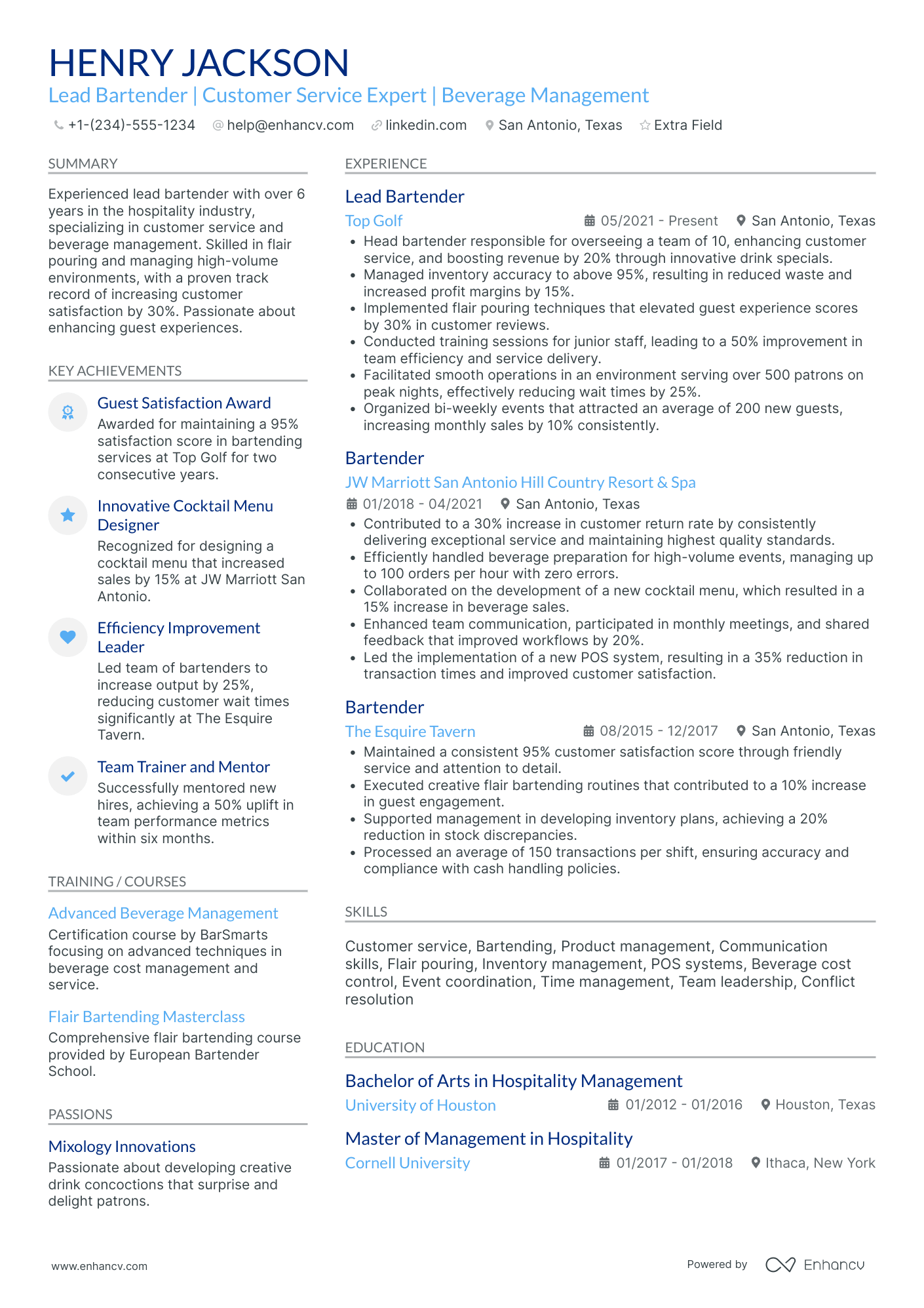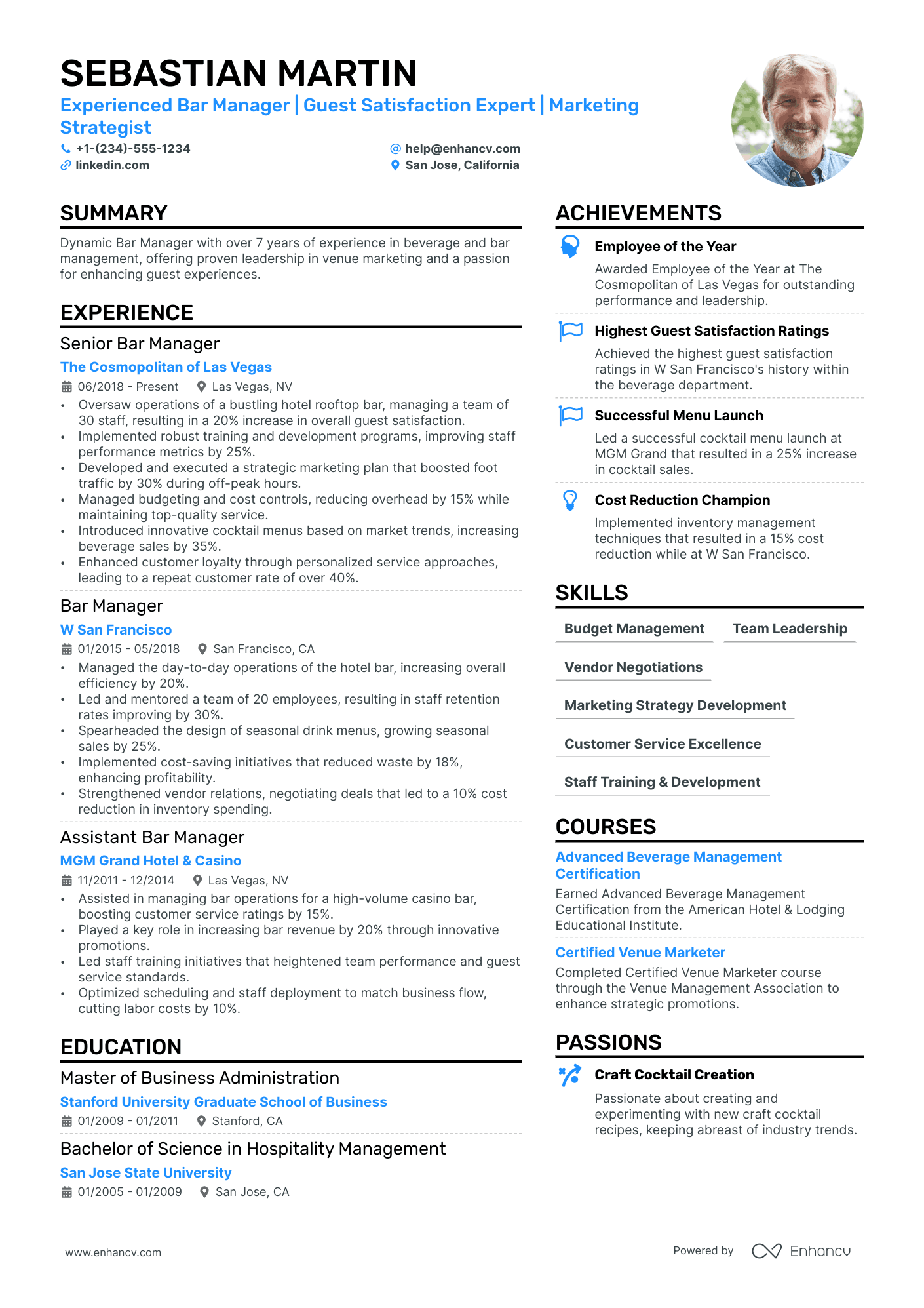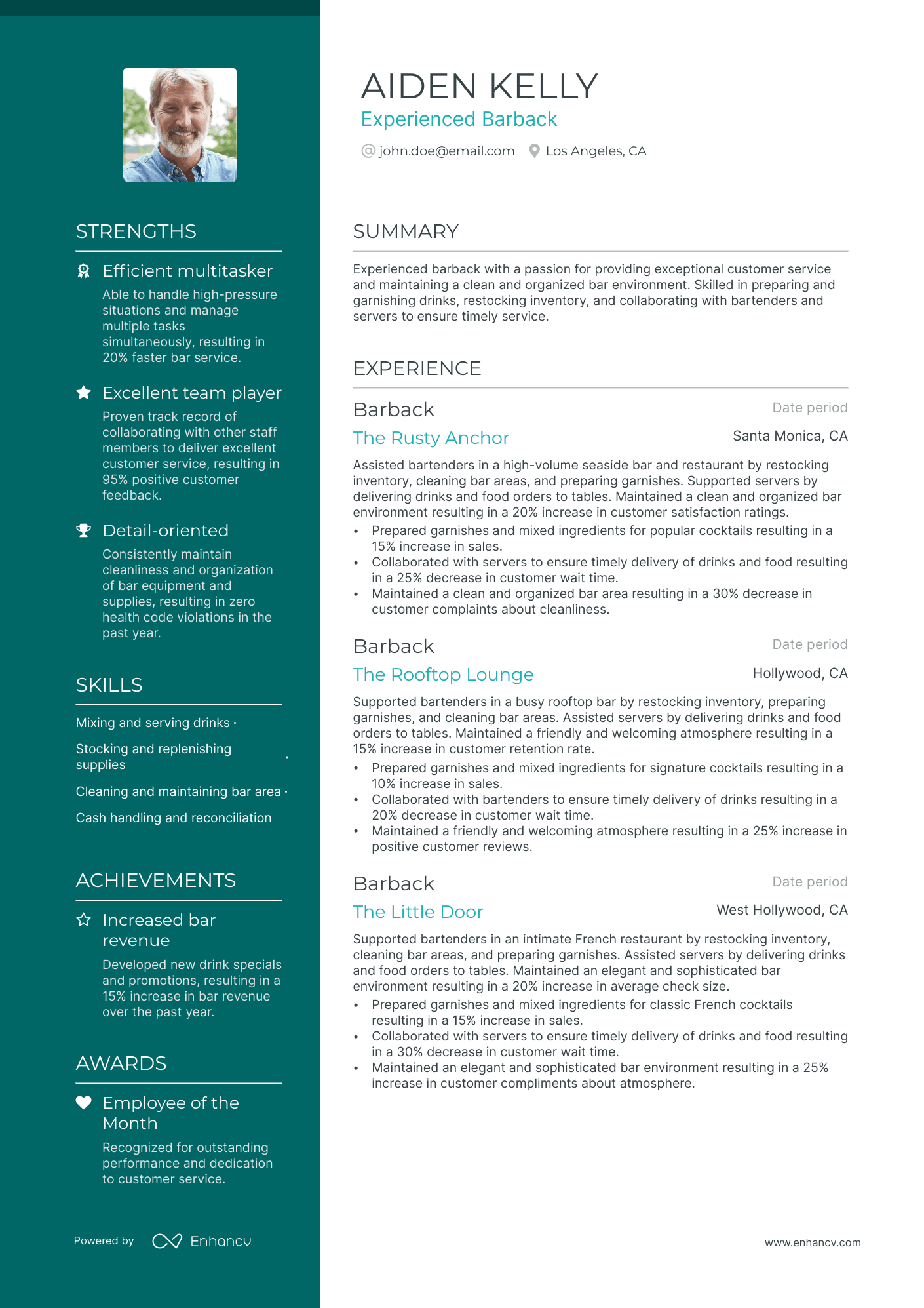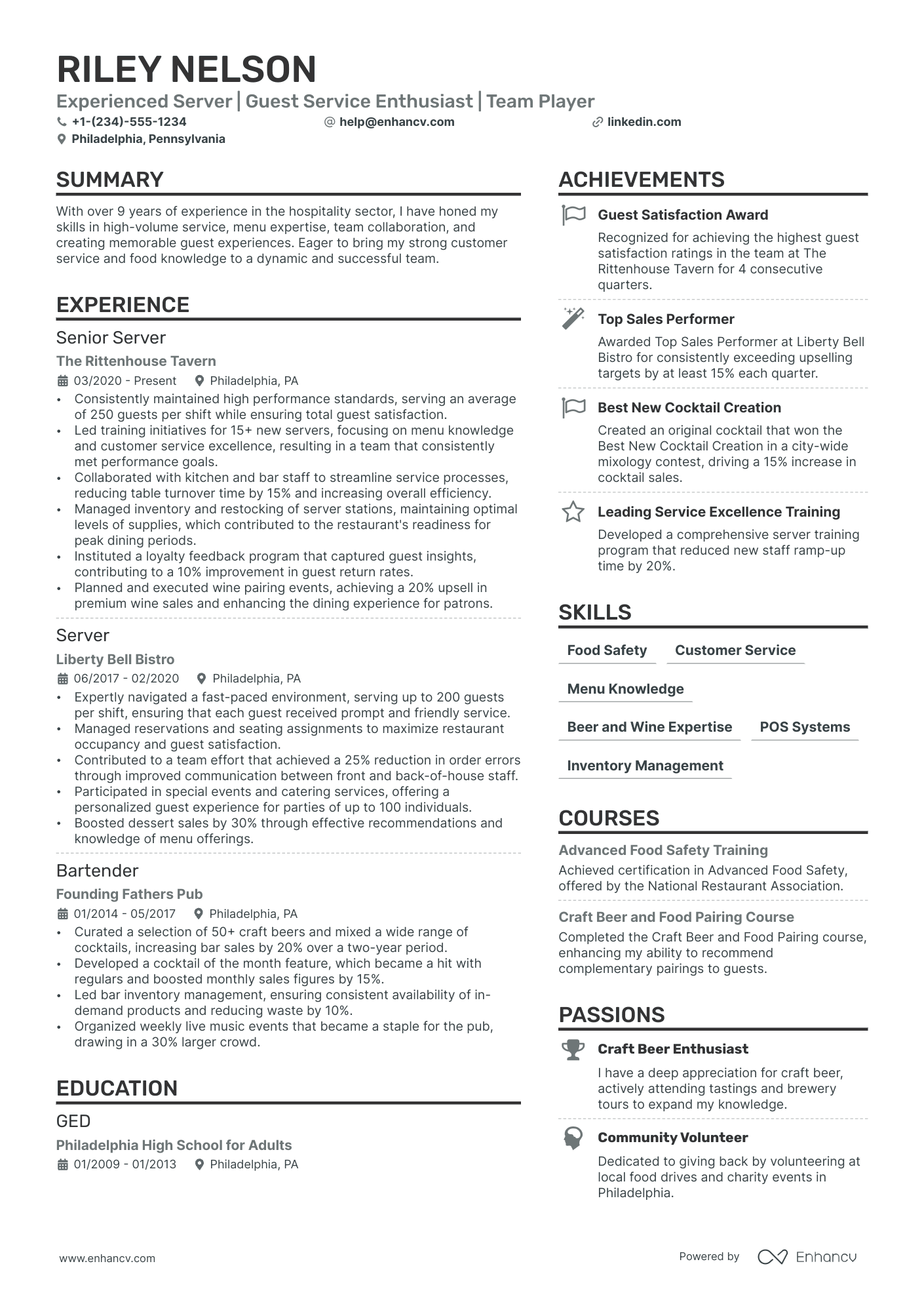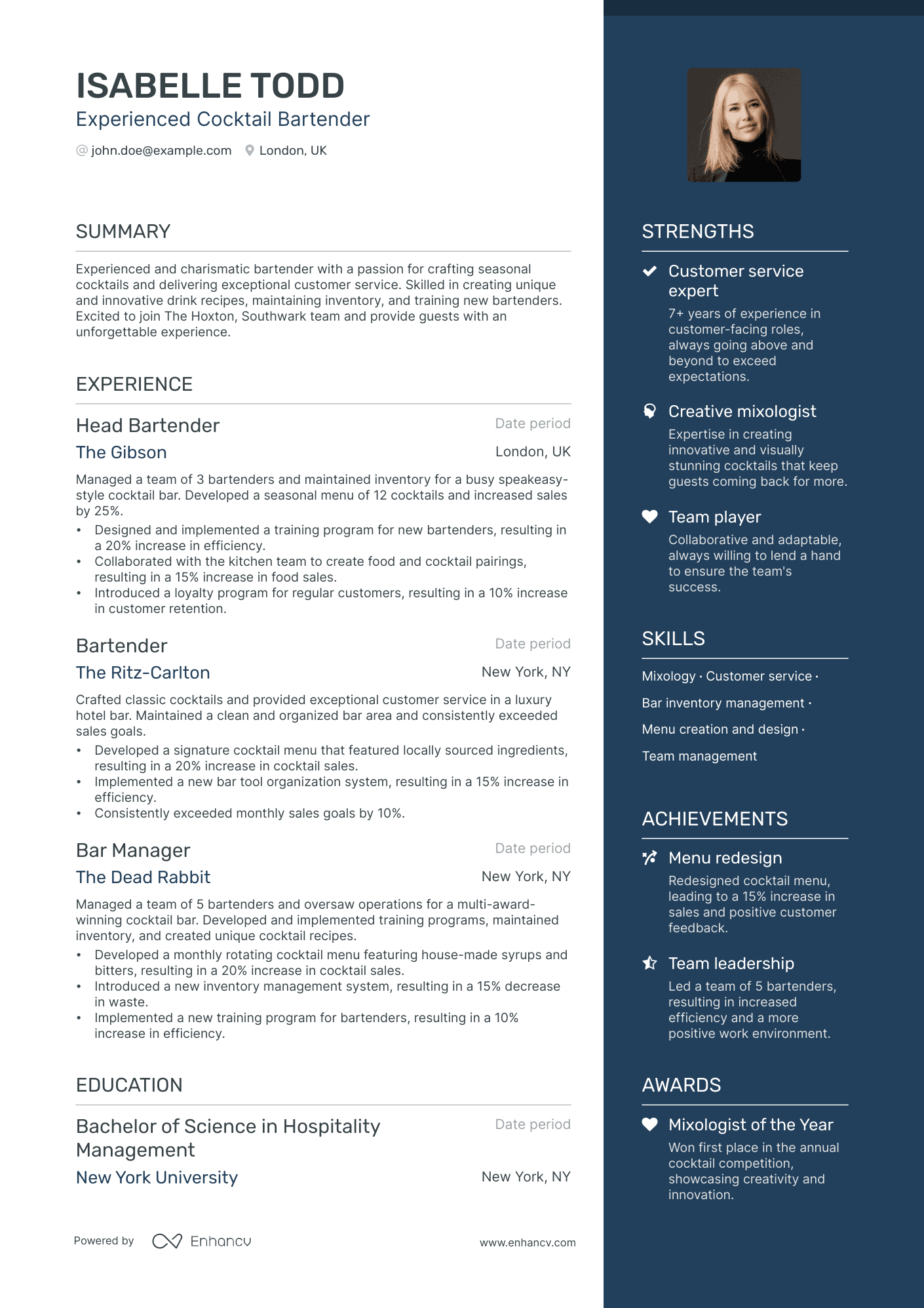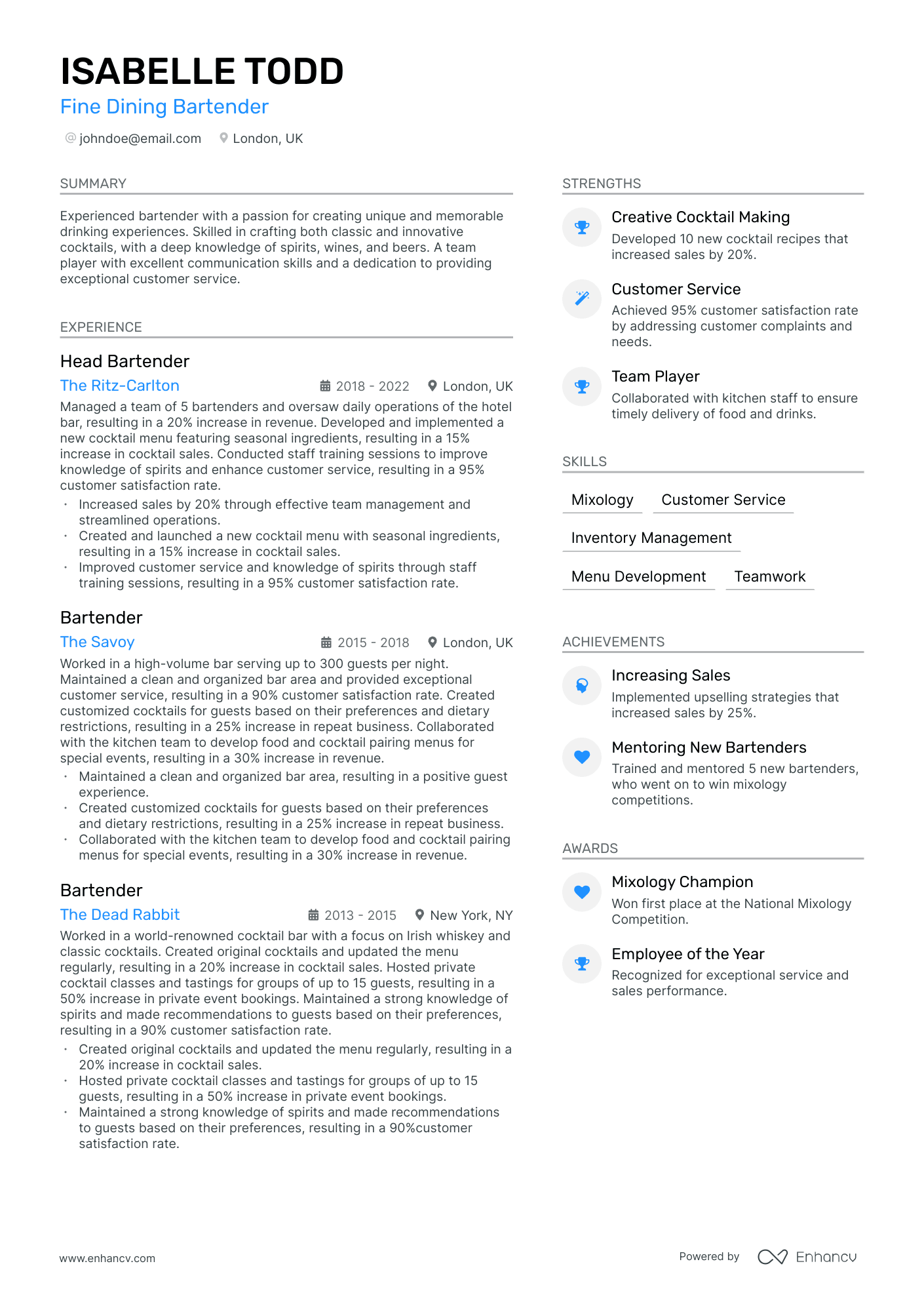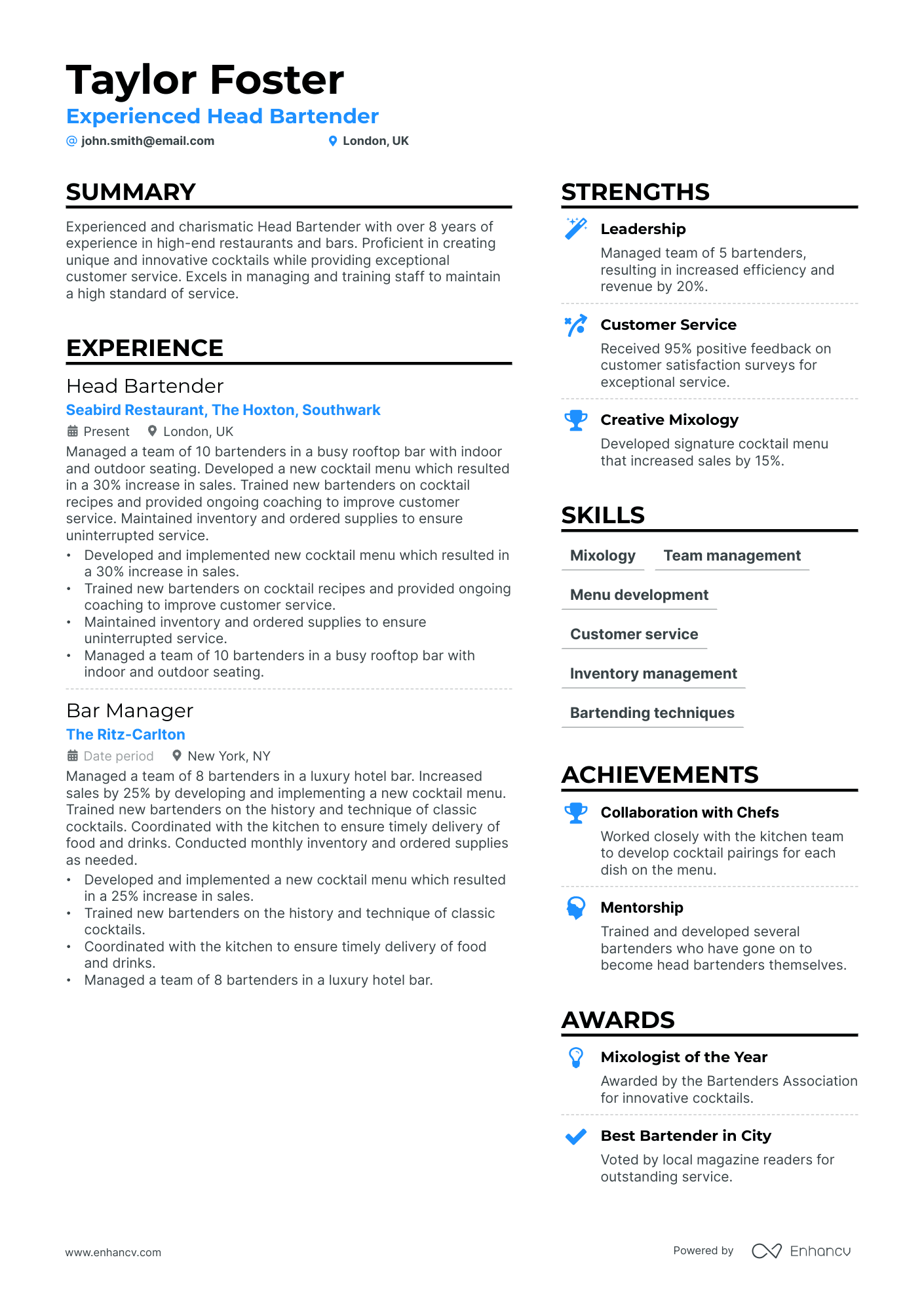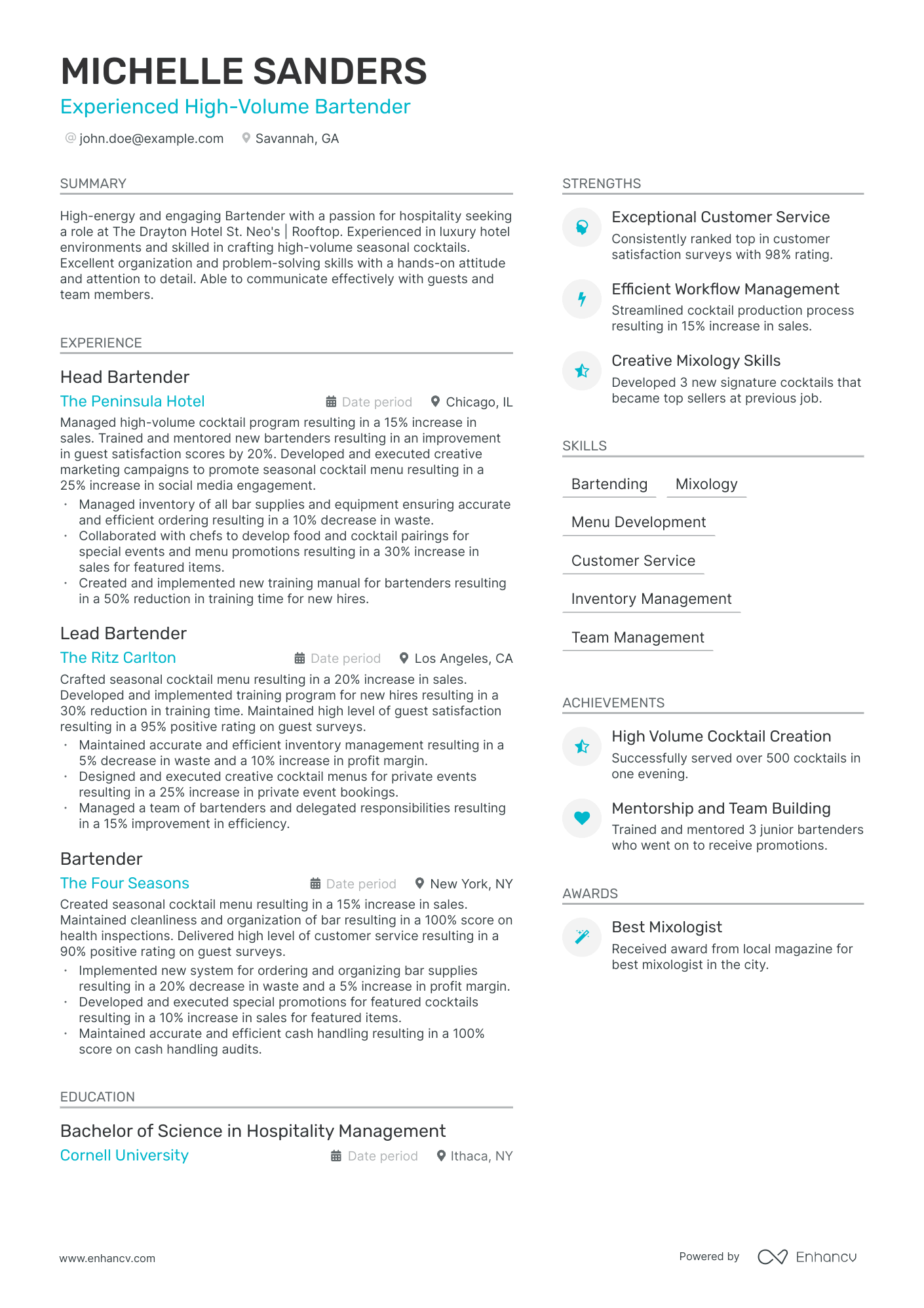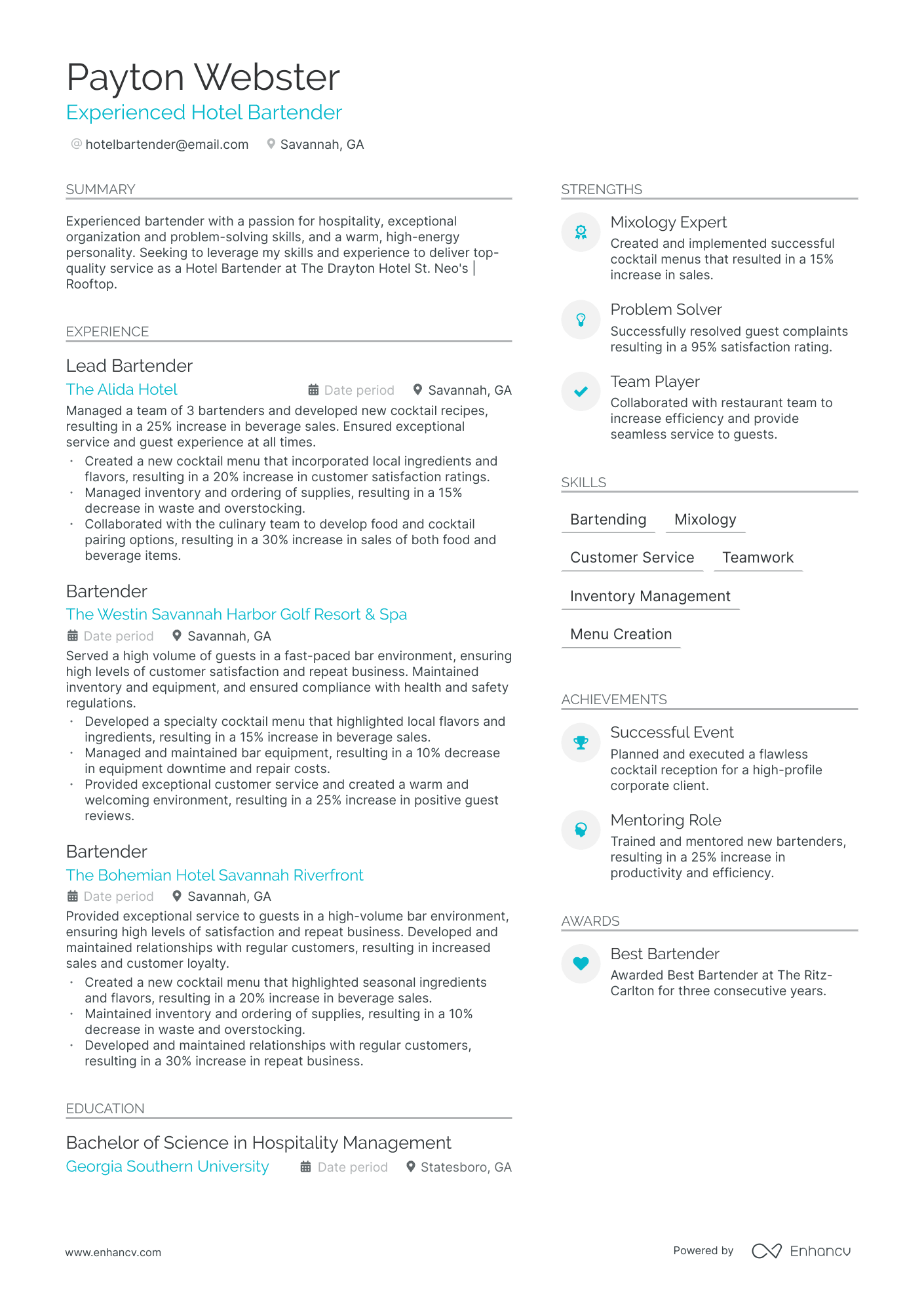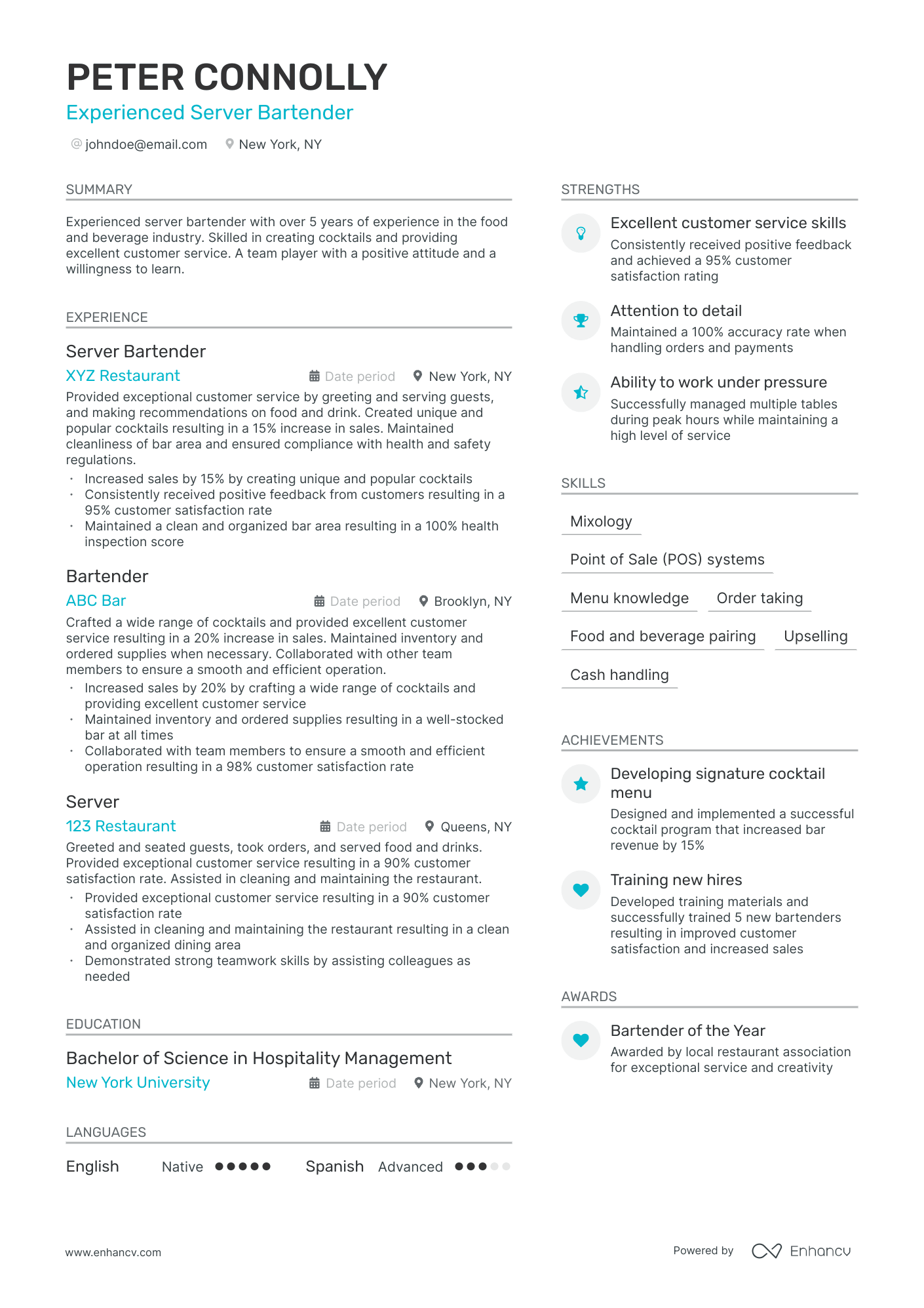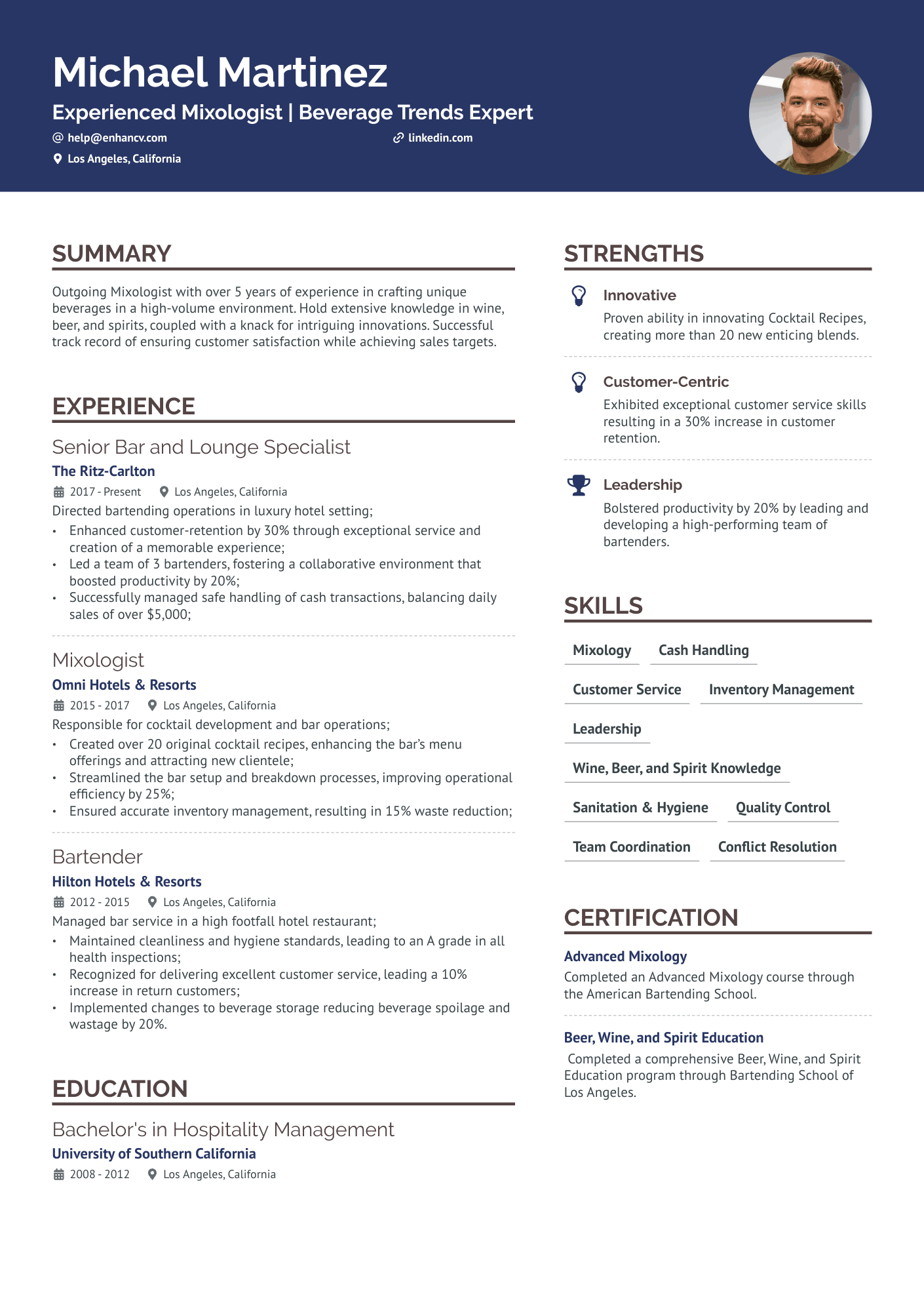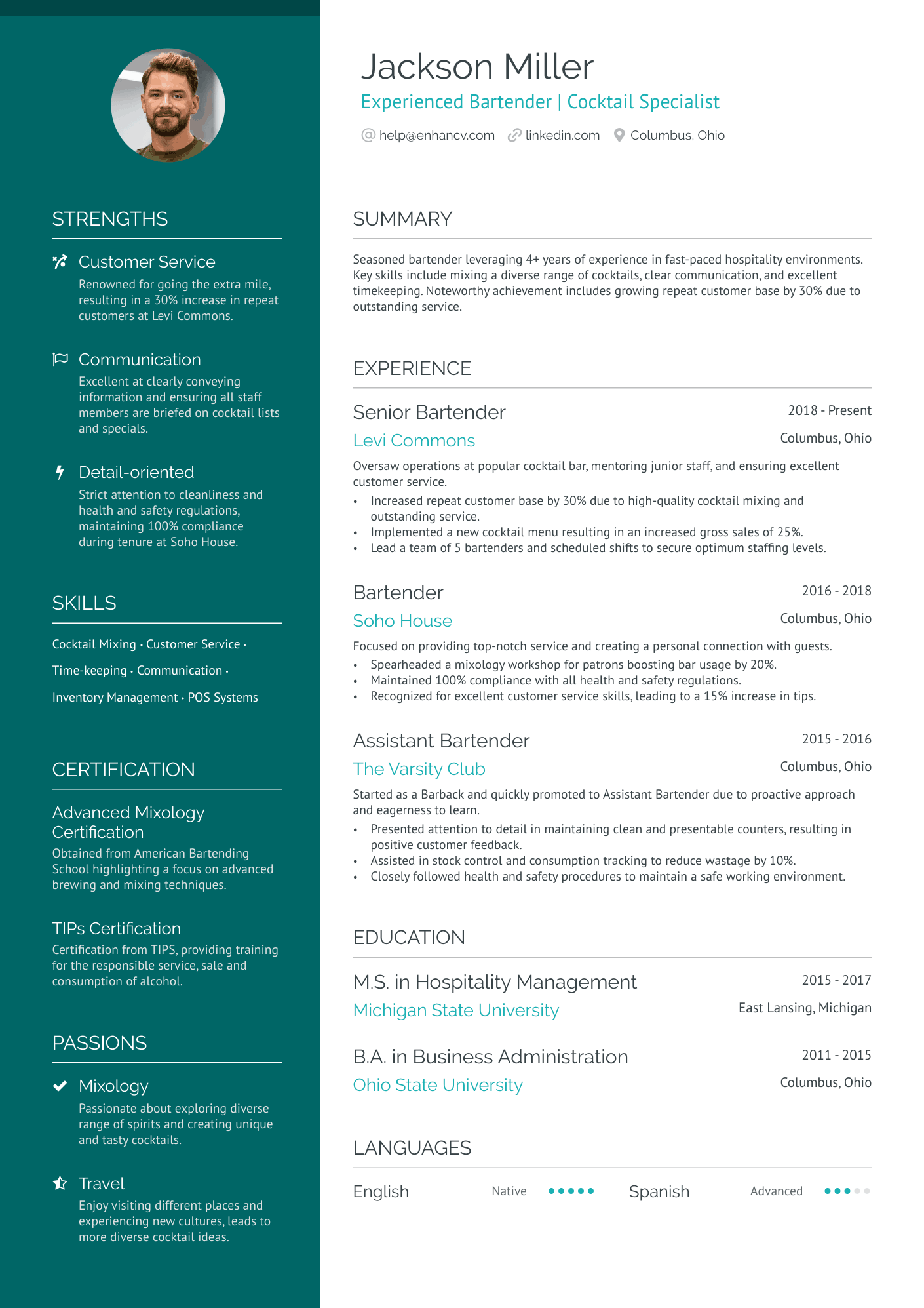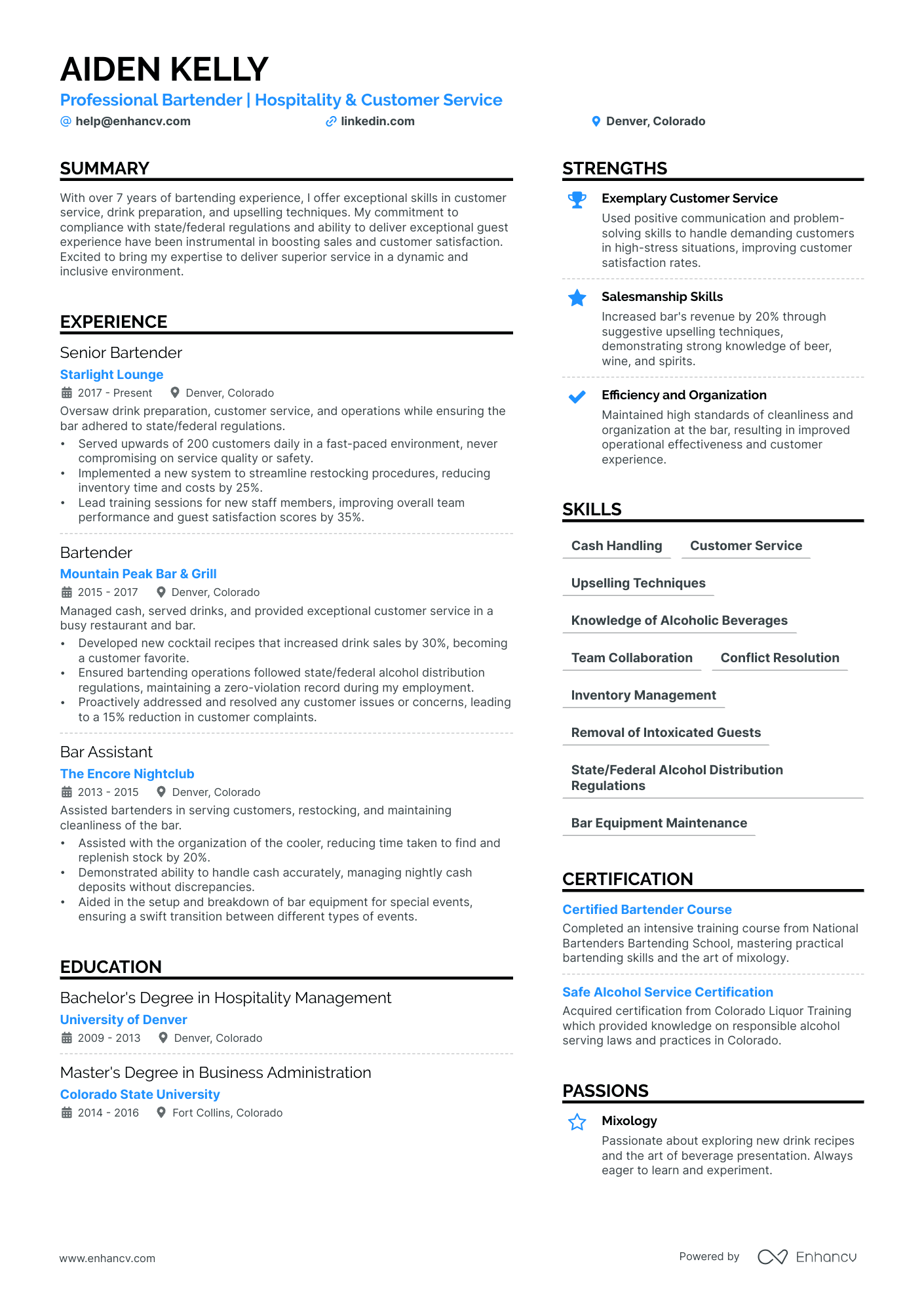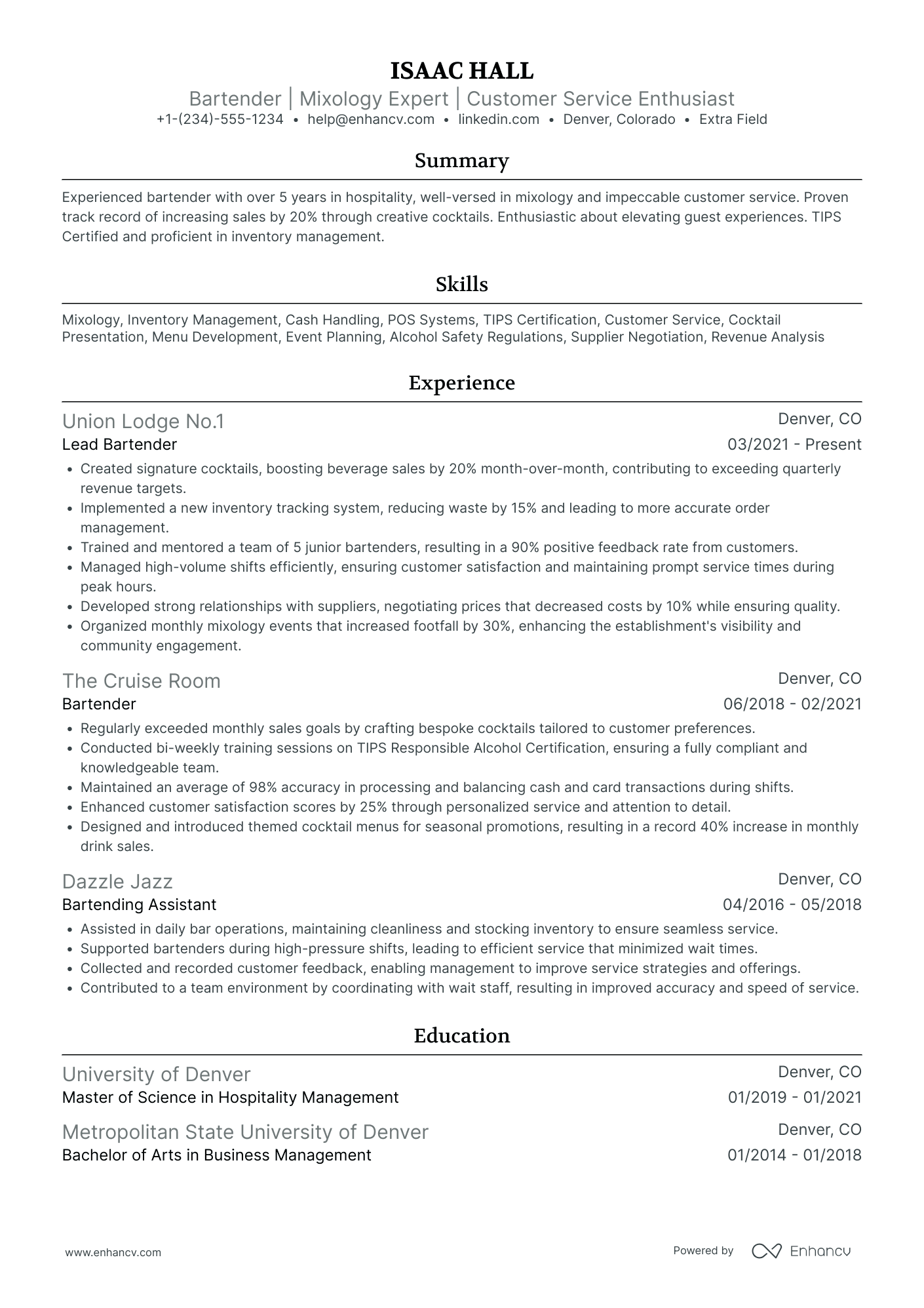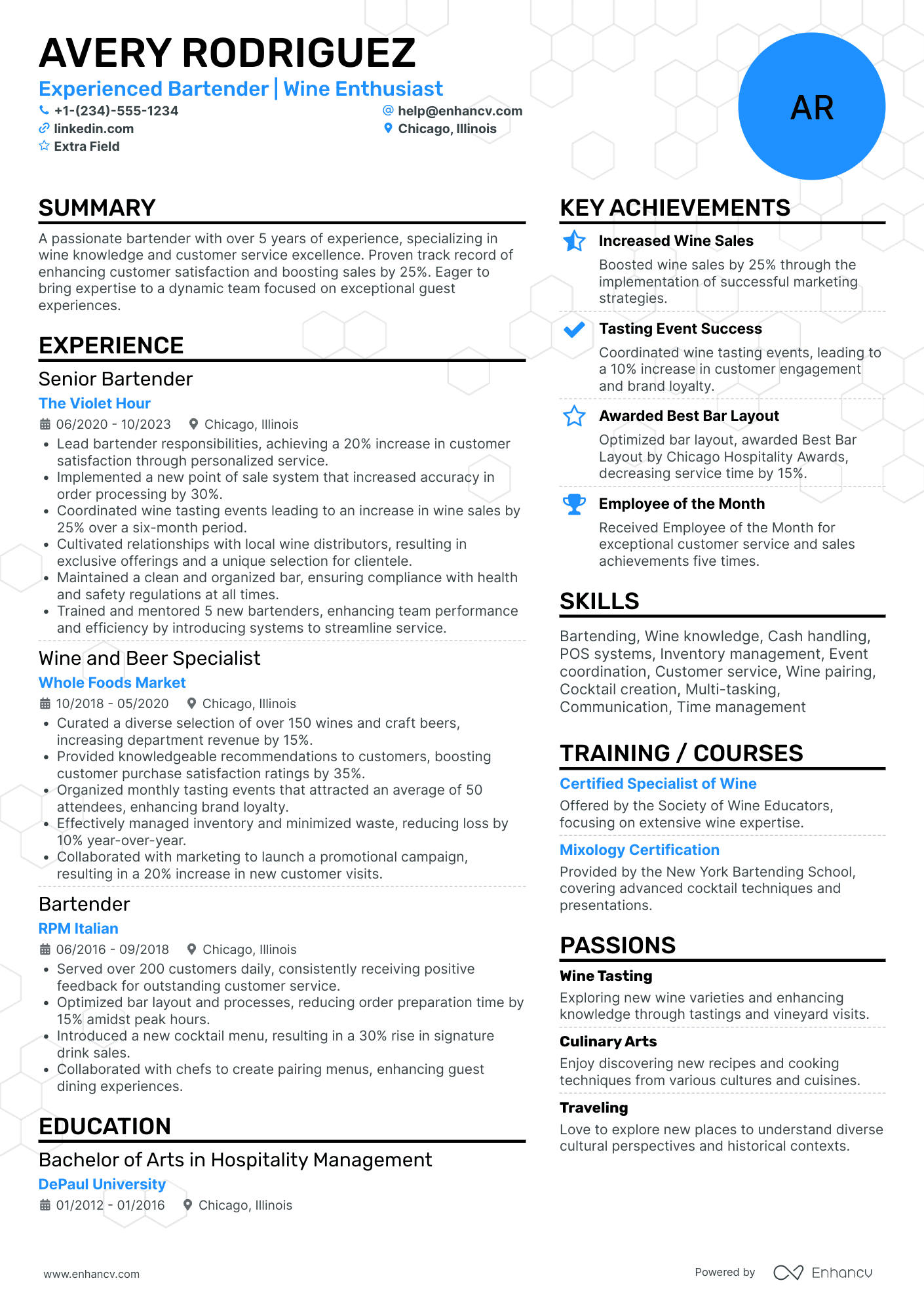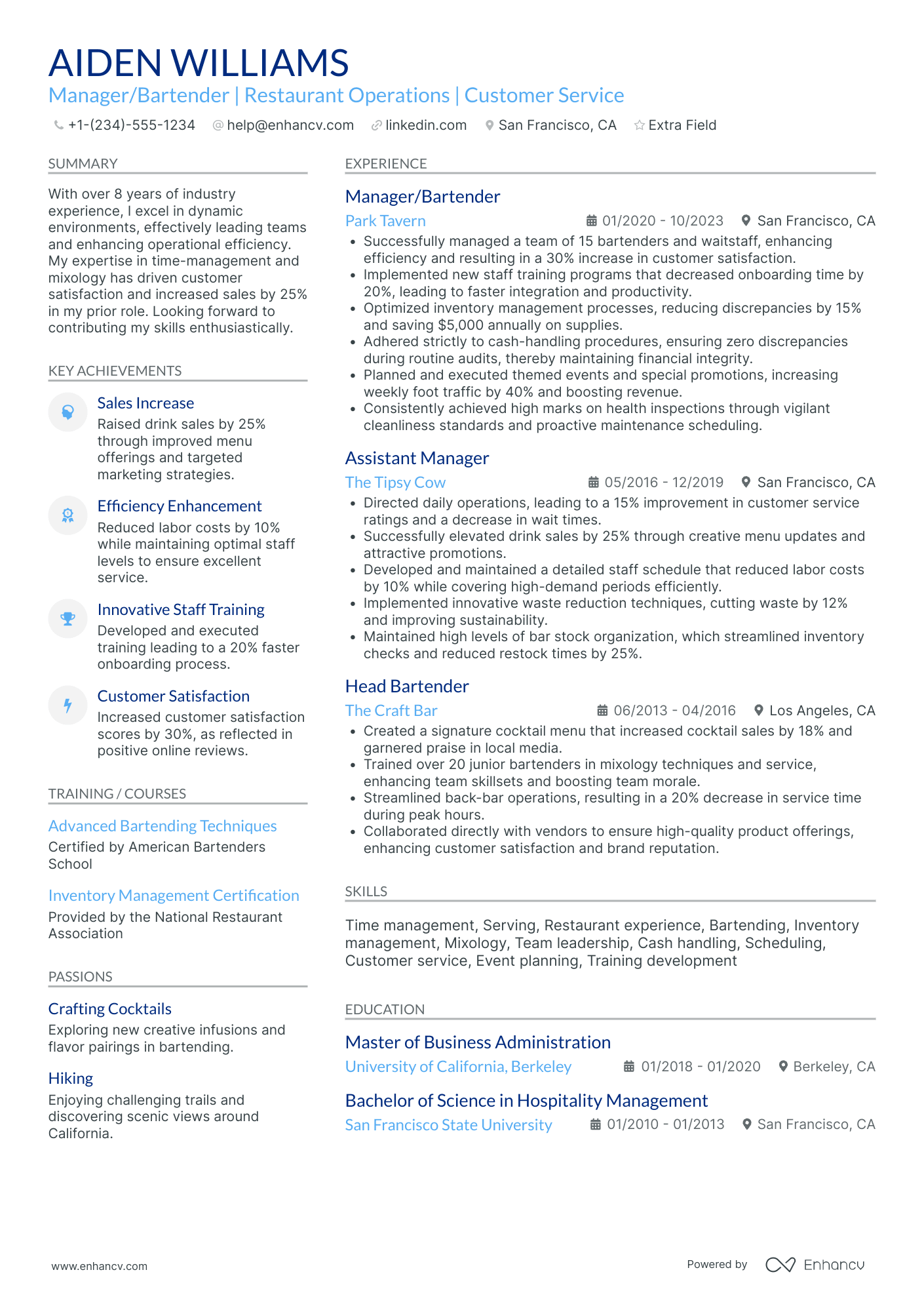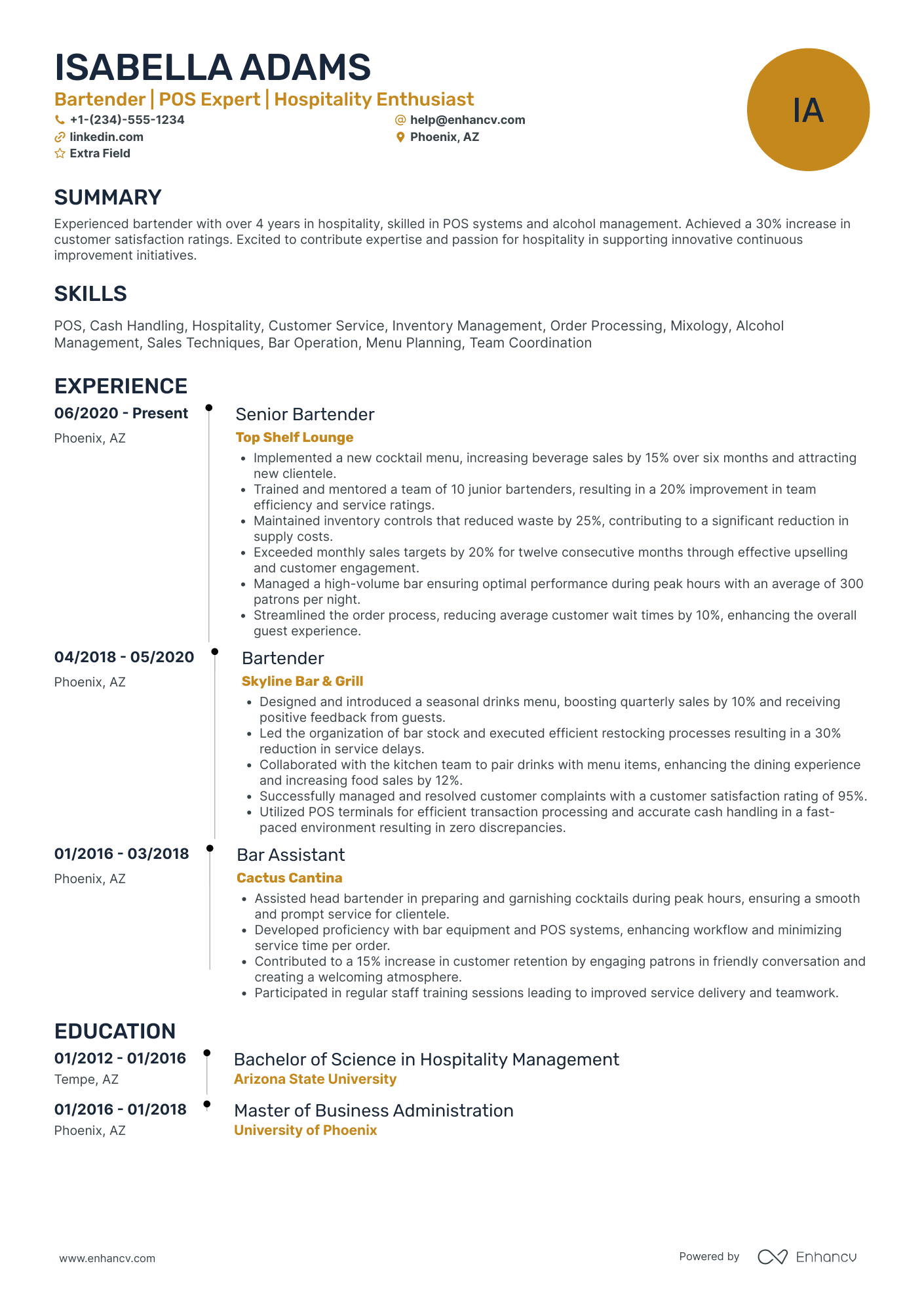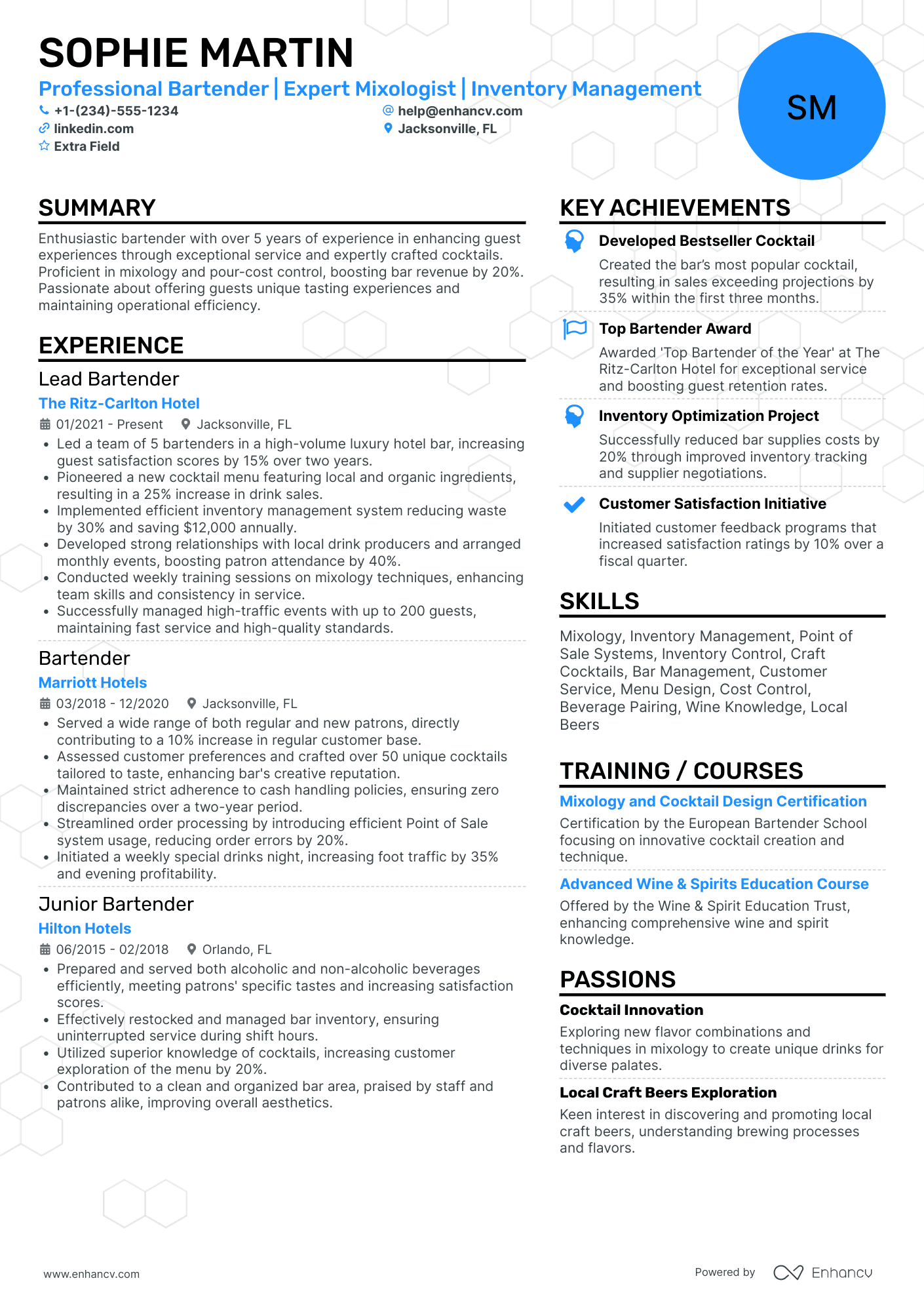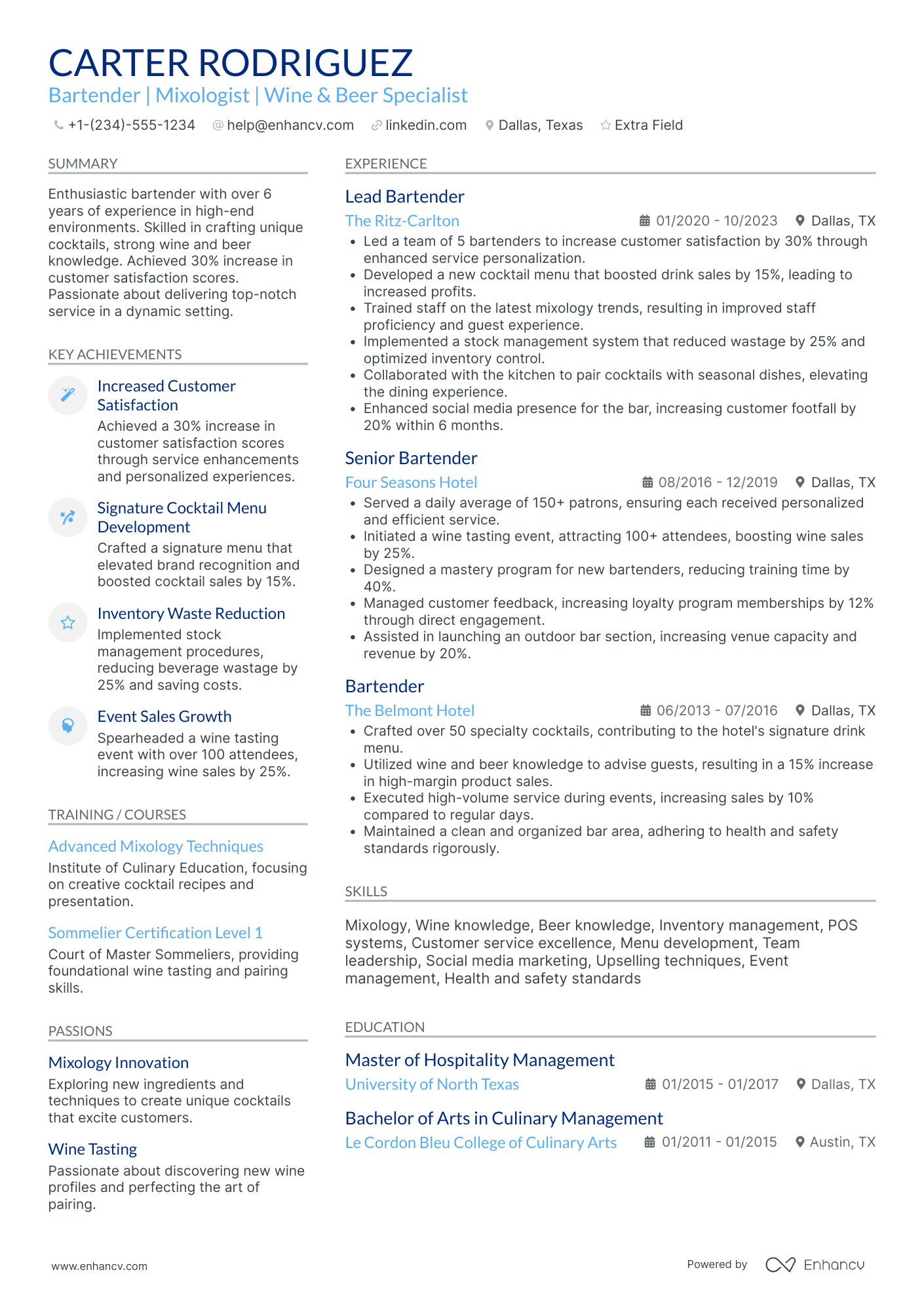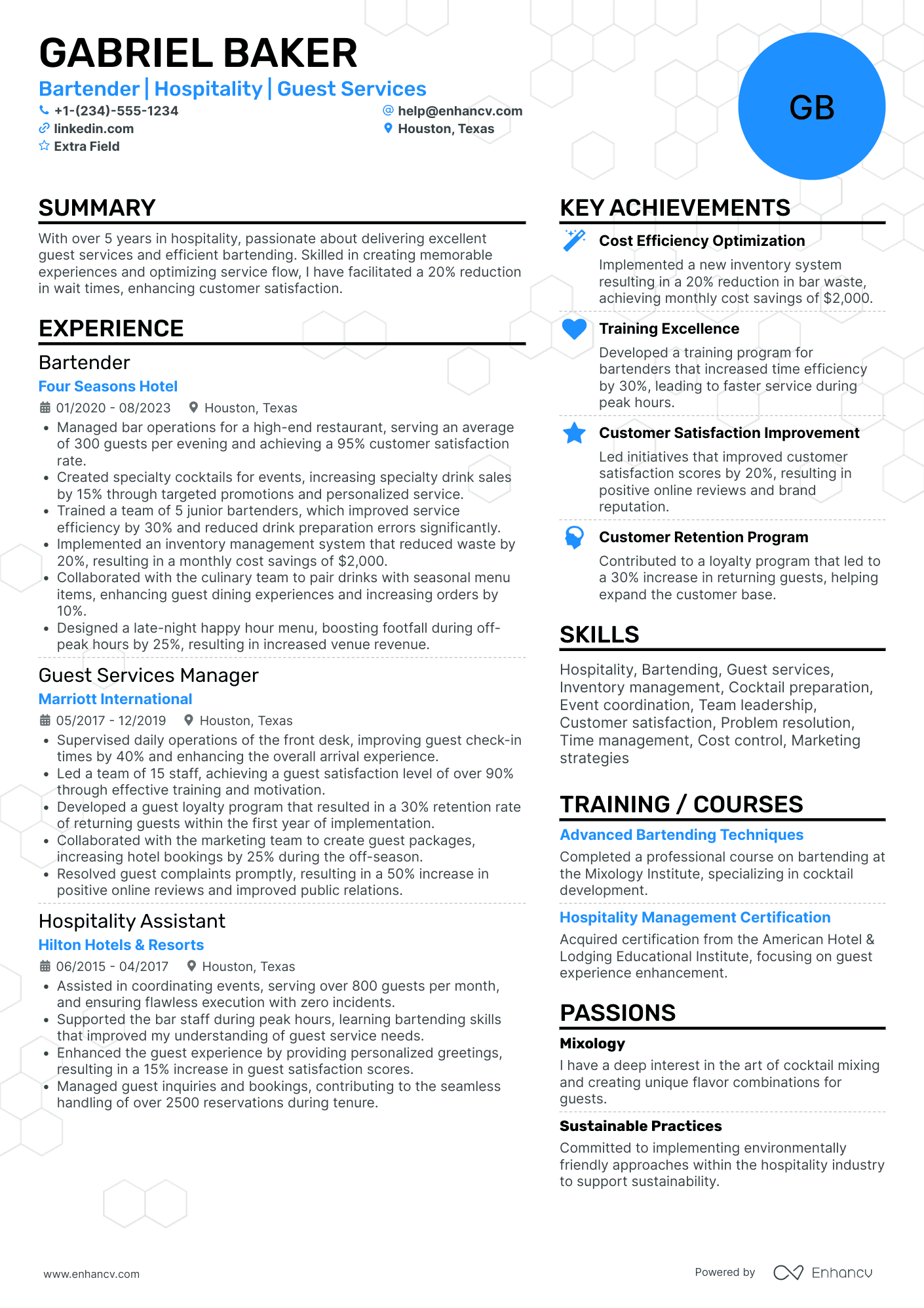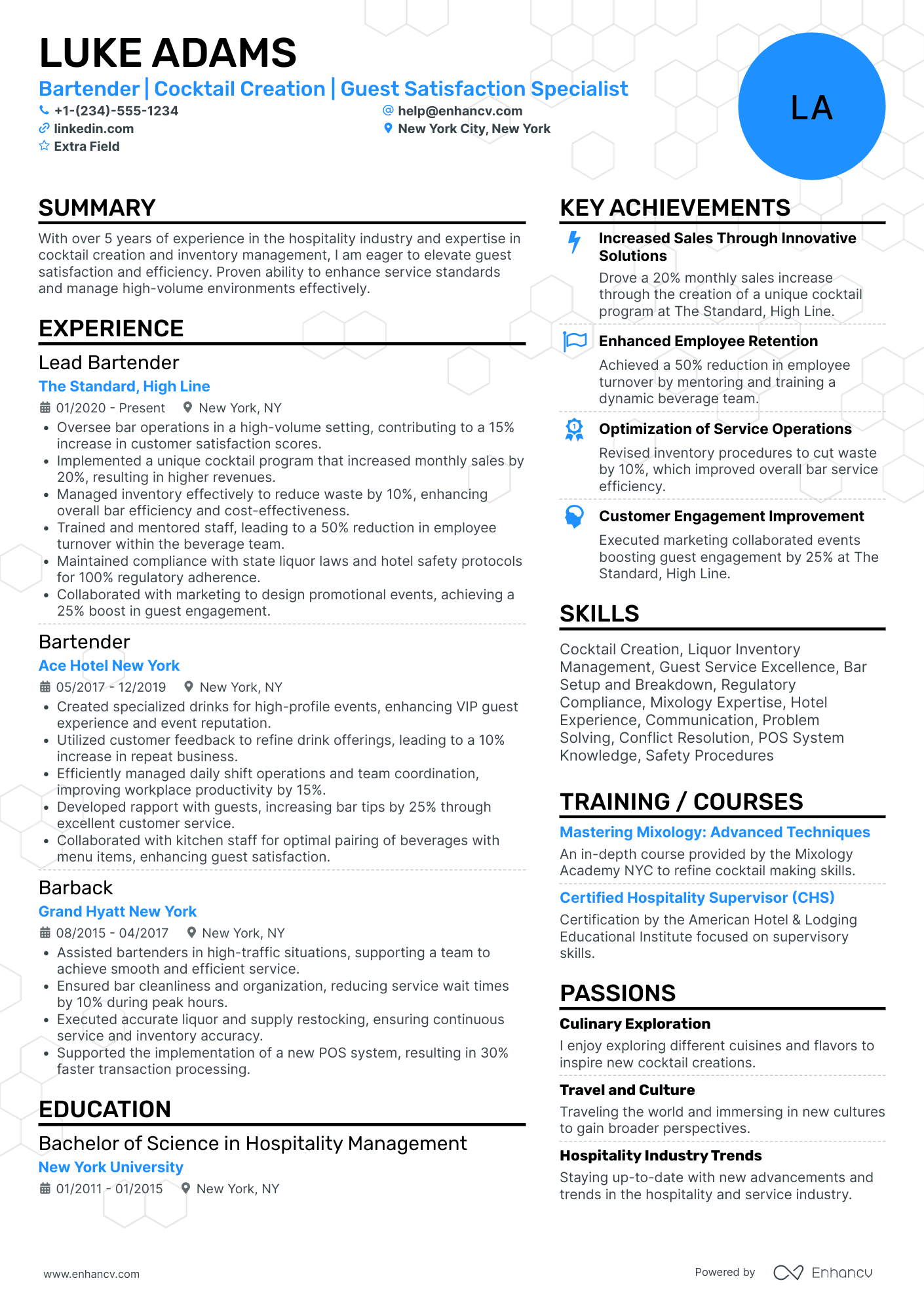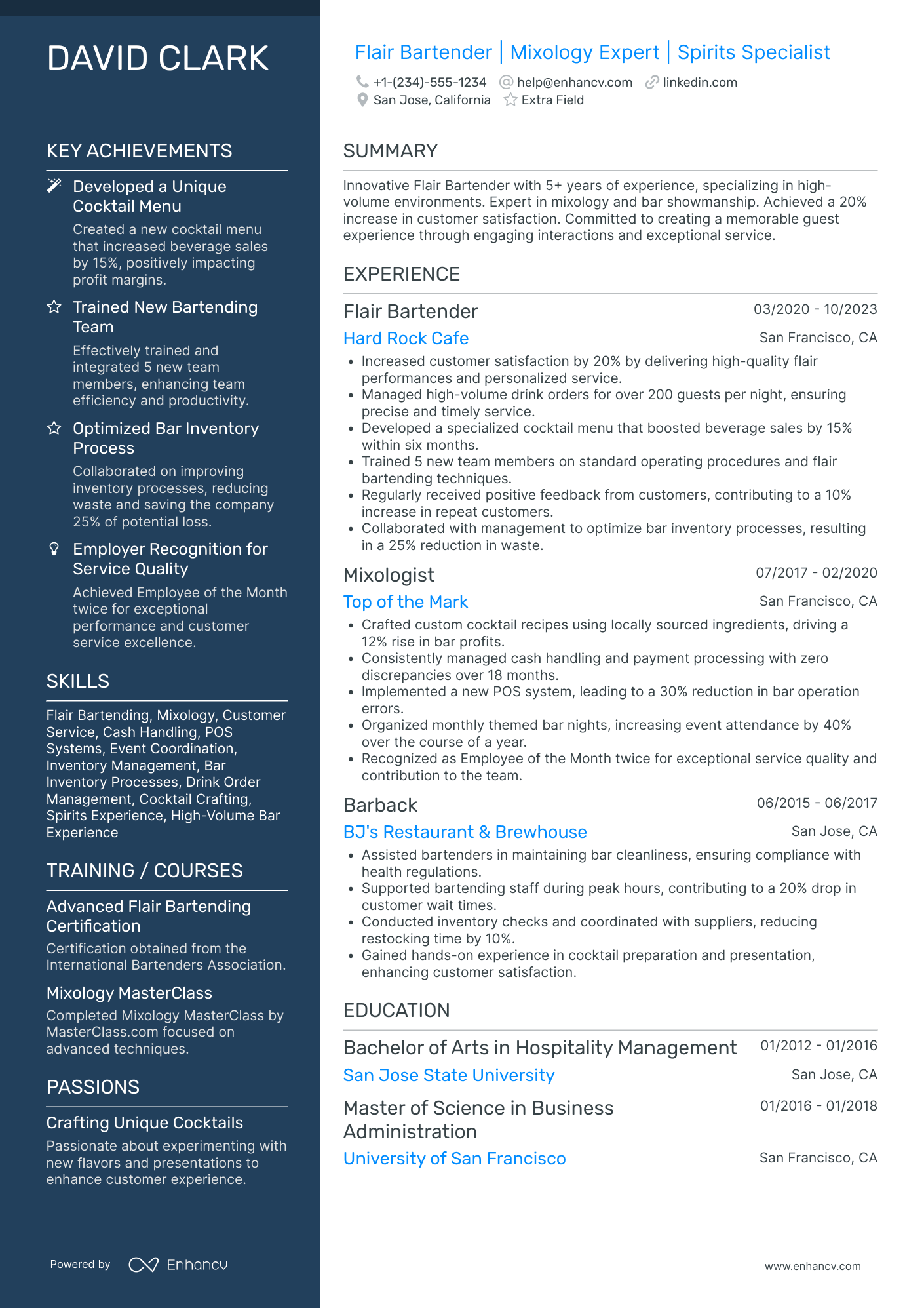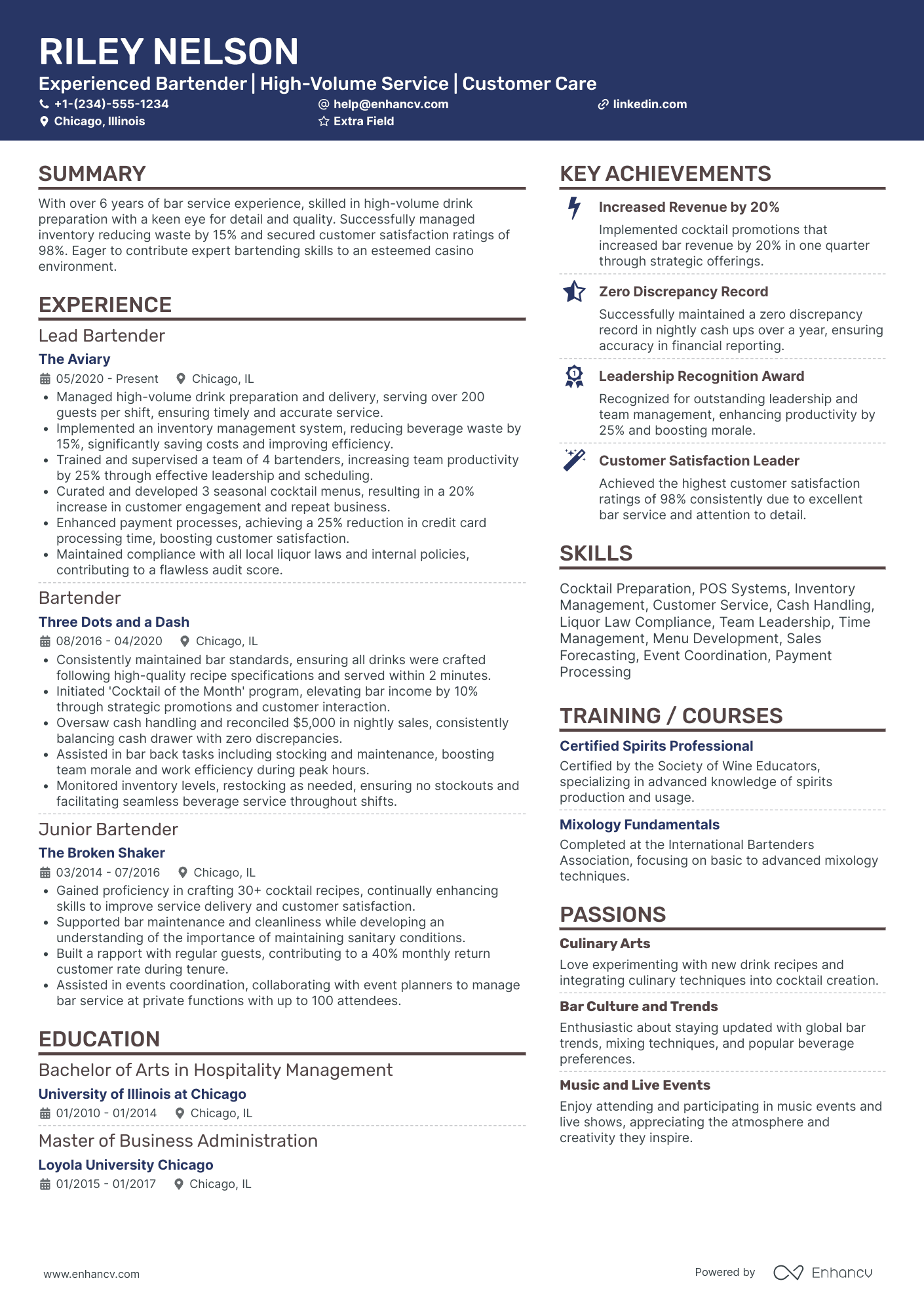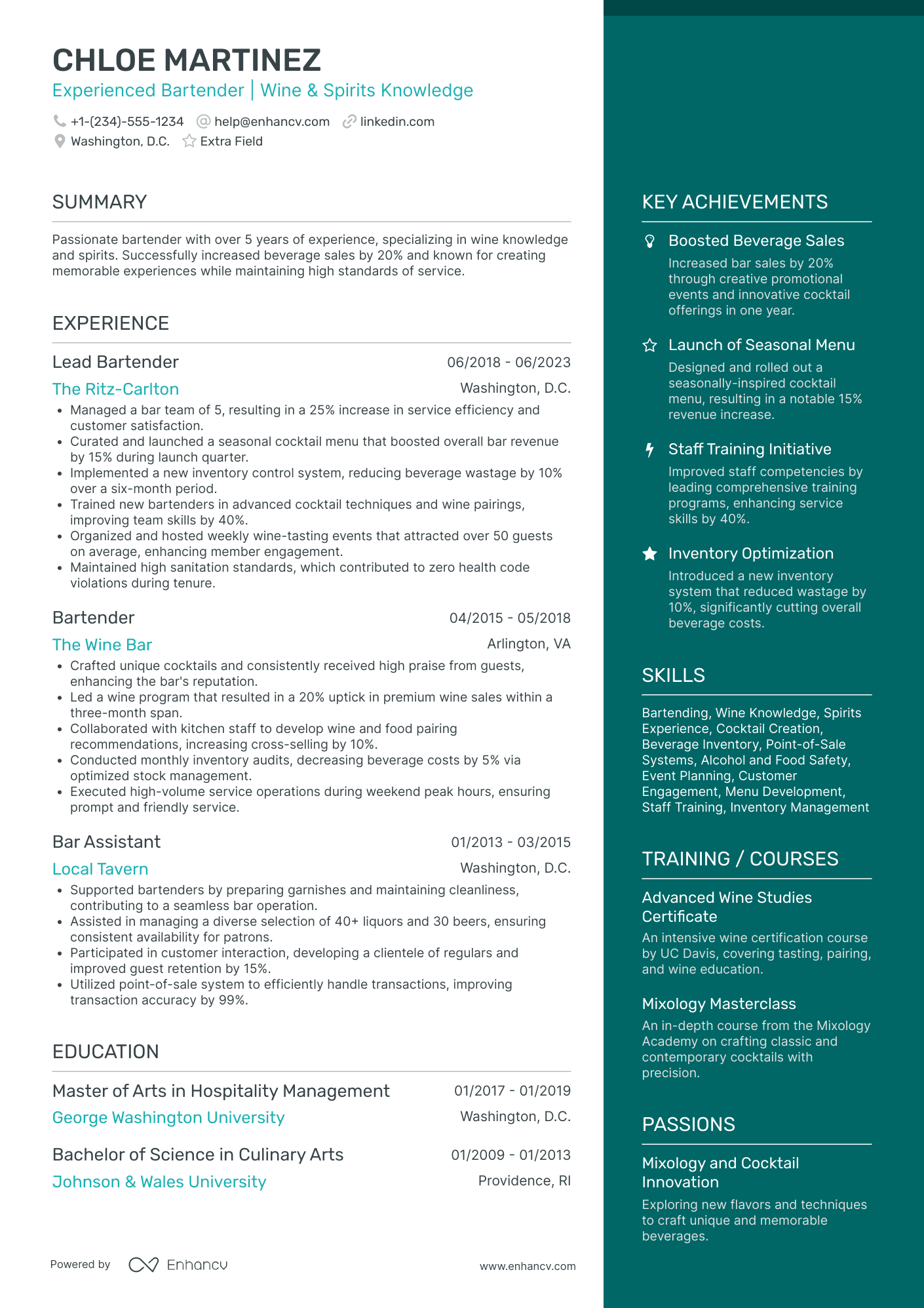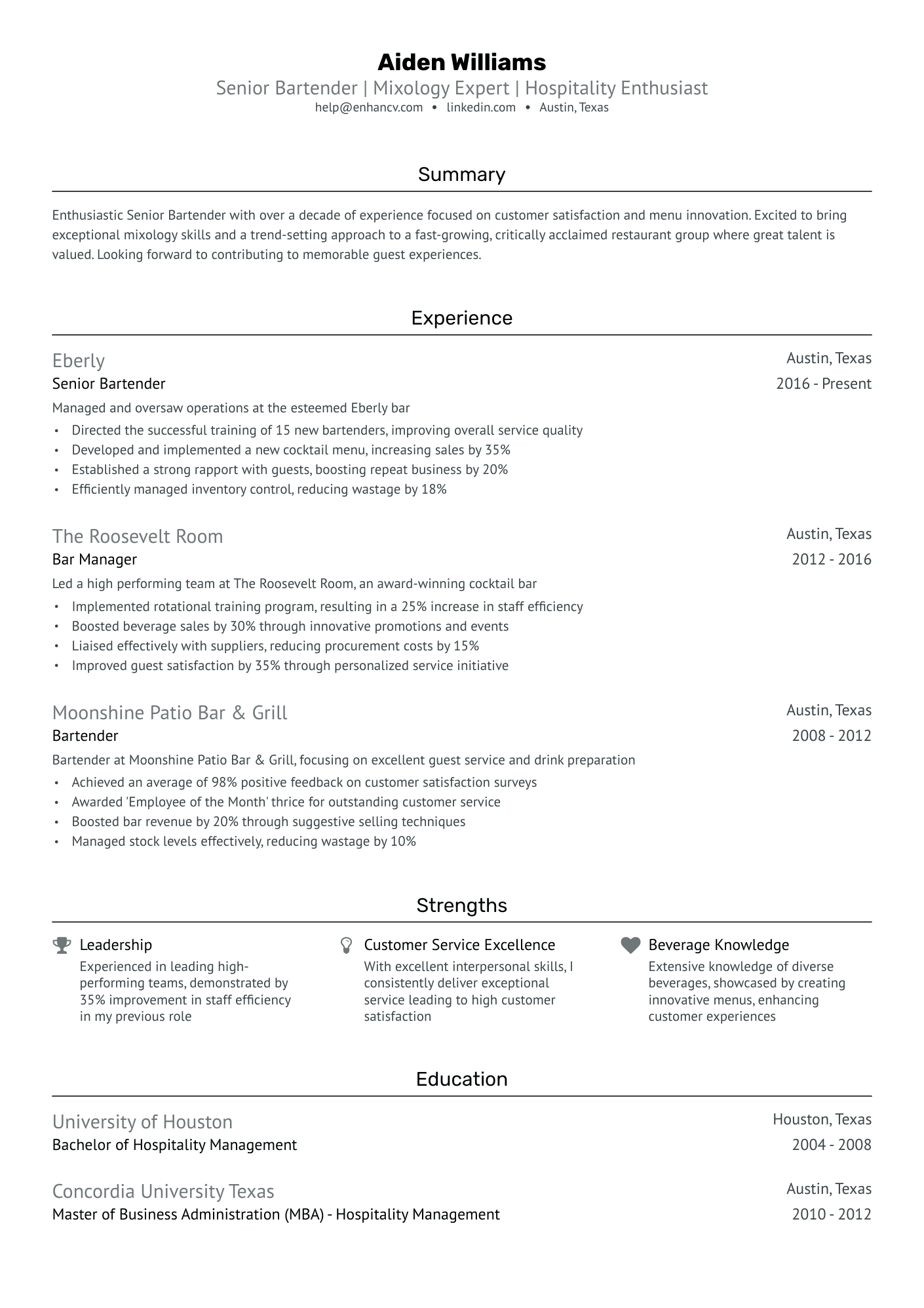As a bartender, you've likely wished for more than two arms and legs to keep up with the rush. While it's an energetic job that can be emotionally, mentally, and physically draining, it also has its perks: good tips, a fun atmosphere, and the benefit of just "going off" and being your wild self.
If you're on the hunt for something new, here’s some good news: bartender jobs are projected to grow by 3% from 2022 to 2032, outpacing the average for all jobs. This growth means more opportunities are on the horizon. With a standout resume, you're well on your way to securing a great new position!
Want recruiter calls but unsure how to grab their attention? We’ll guide you. This guide includes:
- The ideal resume format and templates to highlight your bartending skills effectively.
- How to describe your bartending experience and demonstrate your proficiency.
- How to align your skills with the job description to meet the specific needs of the employer.
- How to emphasize your experience with key bartending practices and familiar equipment or software (like POS systems).
- The best way to detail your standout achievements, such as improving cocktail quality or boosting bar revenue.
- Discover if education and certifications are a plus for employers.
Want to explore more opportunities in support staff? Check out these resume examples for inspiration.
- Event bartender Resume Example
- Barista Resume Example
- Restaurant Server Resume Example
- Bartender Cover Letter Example
How to format a bartender resume
Picking the right resume format is key to making a strong impression as a bartender. Consider these three formats:
- Reverse chronological resume: Best for bartenders with a steady work history, this format lists your positions starting with the most recent. It’s great for showcasing a consistent job record and career progression, which is appealing to employers seeking experienced bartenders.
- Functional resume: If you’re new to bartending, transitioning from another career, or have gaps in your employment, a skills-focused resume is ideal. This format highlights your bartending skills and qualifications, emphasizing your abilities over your job history.
- Hybrid resume: Ideal for barkeeps with a mix of experience and skills, this format combines elements of both chronological and functional resumes. It lets you showcase your relevant skills alongside your job history, making it perfect for displaying a broad range of abilities and steady career advancement.
Here are some useful tips to enhance your bartender resume:
- Use a modern template for a visually appealing resume. Both single and double-column formats work well.
- Opt for professional fonts like Arial, Rubik, or Times New Roman, and maintain font size between 10 and 12 points for readability.
- Limit your resume to one page, or two pages if you have extensive experience.
- Set margins to about 1 inch to create a neat, organized look.
- In the header of your resume include your name, phone number, location, and professional email address.
- Add a link to your LinkedIn profile if it's up-to-date and relevant.
- Choose colors like dark green or blue to give your resume a refined look, helping your skills and experience take center stage.
- Always save your resume as a PDF file to ensure the format remains consistent across different platforms.
Different markets have specific resume formats – a Canadian resume could vary in layout.
PRO TIP
To make your resume ATS-friendly, follow the tips above and include relevant keywords. Avoid adding a photo of yourself unless the job ad specifically requests it. Tailoring your resume to the job description is a smart strategy to increase your chances of getting called in for an interview.
Take advantage of our intuitive AI resume checker for a detailed 16-point evaluation and improve your resume for free.
Is your resume good enough?
Drop your resume here or choose a file. PDF & DOCX only. Max 2MB file size.
Once we've decided on the right format, we can create an eye-catching bartender resume. Key sections to focus on include:
The top sections on a bartender resume
- Job history: Show your practical work experience in bartending.
- Skills: Highlight your precise skills relevant to bartending duties.
- References: Show proof that other employers were happy with your work as a bartender.
- Work availability: Indicate your work schedule flexibility and preferred shifts.
- Objective statement: Talk about your career goals and demonstrate your enthusiasm for the role.
We'll break down the sections recruiters prioritize and how they evaluate your qualifications.
What recruiters want to see on your resume
- Mixology skills: Recruiters give priority to this because it shows your ability to create a multitude of drinks.
- Customer service experience: This is significant as your dealing with customers directly impacts their experience.
- Physical endurance: The rigorous demands of bartending like standing for extended hours means staying fit is a necessity.
- Knowledge of health and safety rules: This is emphasized to ensure you can follow the proper safety regulations.
- Ability to use cash registers and POS systems: Your familiarity with such systems shows your ability to handle transactions efficiently.
The best bartender is one who doesn't just serve drinks but serves experiences.
Robert Simonson
Whatever resume format you choose, the experience section is crucial. We'll help you create the perfect resume for a bartender position.
How to write your bartender resume experience
The experience section of your resume presents your bartending background. To make it shine, follow these tips:
- Include only bartending-related experience, listing the bar name, a brief description, and dates, with up to 6 bullet points per job.
- Emphasize the actual outcomes of your work, using numbers or percentages to showcase your effectiveness.
- Describe your duties with action verbs to make them clear and interesting.
- Underscore your most important and relevant achievements in each job's description.
Below is an actual example of a job posting for a bartender. We’ll align our experience entries with it to demonstrate how a targeted resume stands out.
Job title: Bartender
Position Summary: Prepare and service beverages for servers and guests in a speedy, efficient, friendly, and professional manner.
Job Duties:
- Prepare all drinks to Moonlight Basin standards and specifications for the customers and servers,
- Ensure that the proper materials and supplies are on hand.
- Connect with guests.
- Ensure that minors and intoxicated persons aren’t served alcoholic beverages.
- Act as the cashier for the servers when necessary.
- Provide guests with the best possible service skills and charm, while maintaining a professional distance and attitude.
- Continually create emotional attachments with each guest encounter and guarantee a welcoming environment.
- Maintain the cleanliness of the bar area by disposing of all waste, clearing and cleaning all glassware, and wiping down bar and preparation areas throughout and at the end of the shift.
- Provide opening and closing inventory of spirits.
- Fill out requisitions and all necessary paperwork at the end of each shift.
Qualifications:
- Education: High school or equivalent education required.
- Experience: One year high-volume bar experience required.
- Customer service experience preferred.
- Ideal candidates will have worked at a fine dining level for one to two years.
- Licenses or Certificates
- Must be the minimum age to serve alcohol.
- Associates must maintain a neat, clean, and well-groomed appearance per Moonlight Basin’s standards.
Physical Demands:
- Most work tasks are performed indoors. Temperature is moderate and controlled by hotel environmental systems; however, it must be able to work in extreme temperatures like freezers (-10°F) and kitchens (+110°F), possibly for one hour or more.
- Must be able to stand and exert well-paced mobility for up to 8 hours in length.
- Must be able to exert a well-paced ability to maneuver between functions occurring simultaneously.
- May be required to lift trays of food or food items weighing up to 30 lbs.
- Must have the ability to bend, squat, and lift 40 lbs. on a regular and continuing basis and occasionally lift up to 75 lbs.
- Must be able to push and pull carts and equipment weighing up to 250 lbs. occasionally.
- Must be able to exert well-paced ability in limited space.
- Must be able to bend, stoop, squat, and stretch to fulfill cleaning tasks.
- Requires grasping, writing, standing, sitting, walking, repetitive motions, bending, climbing, listening and hearing ability and visual acuity.
- Talking and hearing occur continuously in the process of communicating with guests, supervisors, and other employees.
- Vision occurs continuously with the most common visual functions being those of near vision and depth perception.
- Requires manual dexterity to use and operate all necessary equipment, including, but not limited to, cutlery used in the cutting of fruit.
We'll begin by looking at these badly constructed entries and pinpointing the problems.
- •Mixed and served beverages to customers in a fast-paced environment.
- •Maintained cleanliness and organization of the bar area.
- •Managed inventory and restocked supplies as needed.
- •Provided customer service, ensuring a positive experience for all patrons.
Here’s what’s missing in that example:
- Lacks details: The bullet points are too general and don't specify the extent or impact of the tasks.
- Omits key duties: Important responsibilities such as handling transactions are left out, which are crucial for a bartender role.
- No measurable achievements: The entries don't include any quantifiable accomplishments, like sales increases or customer satisfaction scores, to highlight the candidate's impact.
Now, let’s improve that entry to make it more relevant, targeted, and detailed.
- •Prepared drinks for 200+ customers daily.
- •Provided exceptional guest service, receiving a 95% customer satisfaction rate.
- •Prevented service to minors and intoxicated patrons, maintaining compliance 100%.
- •Handled cash transactions for servers, managing $3,000+ nightly.
- •Maintained bar cleanliness, reducing waste by 15% and ensuring health code compliance.
- •Managed inventory and filled out shift-end paperwork, improving accuracy by 10%.
Let’s check out the improvements made.
- Targeted and precise details: The bullet points now offer specific details about tasks performed and their relevance to the barkeep role.
- Quantified achievements: The entry quantifies accomplishments, such as increasing customer satisfaction and reducing waste, showing the candidate’s impact.
- Compatibility to industry standards: The updated entry includes tasks that align with the job post’s focus on customer service and bar management skills.
- Expanded responsibilities: The entry showcases a broad range of responsibilities, from drink preparation to inventory management, highlighting a diverse skill set.
To keep focusing on quantifying, let’s examine some useful ideas for your next application.
How to quantify impact on your resume
For bartenders looking to increase their impact, these tailored tips can be very effective.
- Include the number of drink recipes mastered to show your extensive knowledge and capabilities in the profession.
- Highlight a quantifiable improvement in customer tips to underline excellent service and interpersonal abilities.
- Mention how quickly you can mix specific cocktails to demonstrate efficiency and time management.
- State your record for the highest number of customers served in one shift to exhibit your potential in handling pressure and high-volume traffic.
- Note any impressive sales figures reached during promotions to portray yourself as an individual who can drive sales and benefit the business.
- Include an increase in customer satisfaction scores during your shifts to prove that you prioritize customer experience and satisfaction.
- Indicate your percentage of accurate cash handling or POS transactions to reassure the recruiter about your trustworthiness and attention to detail.
- Record fewer safety or health code violations to showcase your dedication towards maintaining a clean and safe bar environment.
PRO TIP
Be honest on your resume. Lies can be discovered during the interview and harm your chances.
How do I write a bartender resume with no experience?
If you don't have any work experience as a bartender, you might need to start as a barback since bartending is usually the top position and requires experience. To gain this experience, look for a smaller local bar that serves a variety of drinks and see if you can work part-time.
Smaller establishments often provide training, which can be wonderful. If an employer is hesitant due to your lack of experience, emphasize any transferable skills. Show that you’re willing to work hard to become a great bartender.
Let's break down how to put together a resume that creates opportunities in bartending, even for newcomers.
- References: Provide references from teachers, mentors, previous supervisors, or colleagues if available, or note that they’re available upon request. Their recommendations can add credibility to your application and vouch for your abilities and skills.
- Include volunteer experience: List any volunteer work where you assisted at events, managed drink stations, or performed bar-related tasks. Emphasize the skills you gained in these roles, such as multitasking, customer interaction, and drink preparation.
- Leverage any relevant experience: If you’ve worked in customer service or retail, underline your experience in handling transactions, managing customer inquiries, and providing support.
- Create a strong resume profile: Write a compelling resume objective at the top of your resume that underscores your strongest attributes and how they align with the bartender role. Focus on your mixology skills, customer service experience, and ability to thrive in a fast-paced environment.
With your professional background thoroughly described, let's turn our attention to the hard and soft skills that make you a strong candidate for a bartending position.
How to list your hard skills and soft skills on your resume
Including both hard and soft skills on a bartending resume is essential because it shows your technical expertise and people skills, proving why you're a perfect fit for the job.
Let's break down the two types of skills you'll need.
- Hard skills are your technical proficiencies—quantifiable abilities typically learned through training and experience. These include mastering cocktail recipes, using bar equipment, and managing cash transactions.
- Soft skills, on the other hand, relate to how you engage with people. These encompass traits like communication, teamwork, and problem-solving.
Hard skills
Adding hard skills to your bartender resume demonstrates your mastery of the essential techniques and equipment for bartending roles.
Create a section on your resume labeled "Hard skills," ideally placed near the top or right after the work experience section. Specify and prioritize skills such as particular mixing techniques, POS systems, and beverage knowledge you’re proficient in. Tailor these skills to the position you’re targeting.
If you possess a wide range of hard skills, consider categorizing them under headings like "Mixology," "Beverage knowledge," and "Bar equipment" for clearer presentation.
Below are some suggestions suitable for the bartending field:
Best hard skills for your bartender resume
- Mixology
- Bar equipment handling
- Recipe preparation
- POS system operation
- Cash register operation
- Inventory management
- Knowledge of local and state alcohol laws
- Drink pairing
- Cleaning and sanitization
- Wine tasting
- Draft beer handling
- Glassware knowledge
- Cocktail preparation
- Cash handling
- Knowledge of different alcoholic beverages
- Use of soda guns
- Speed pouring
- Distilling
- Layering drinks
- Tap system operation
Soft skills are crucial for your bartending resume because they highlight your ability to interact with customers and manage various situations effectively. Instead of listing soft skills in a separate section, weave them throughout your resume to showcase your interpersonal abilities.
Soft skills
Start by mentioning targeted soft skills and specific examples of using them in your summary or objective.
Furthermore, incorporate relevant soft skills within your work experience and education sections to highlight your customer service and teamwork capabilities. Make sure to include keywords from the job listing to demonstrate your understanding of the role.
Here are some interpersonal skills in bartending that can help you win the approval of employers:
Best soft skills for your bartender resume
- Customer service
- Work ethics
- Communication
- Multitasking
- Creativity
- Patience
- Conflict resolution
- Attention to detail
- Physical stamina
- Time management
- Positive attitude
- Stress management
- Friendliness
- Initiative
- Accuracy
- Active listening
- Problem-solving
- Teamwork
- Organization
- Adaptability
Once the skills section is complete, let's boost your bartender resume with strong education entries.
How to list your education and certifications on your resume
Usually, a GED or a traditional high school diploma meets the requirements for a mixologist role. Employers don't typically ask for specific education or certifications to hire you. However, having some can be beneficial. Just make sure they're well-positioned on your resume.
Here’s how you should list your formal education on a bartender's resume:
- Start with the most recent educational achievement.
- Include the name of the institution and its location.
- State your degree, diploma, or certification.
- Mention the graduation date or expected completion date.
- Underline relevant coursework, specializations, and honors.
Here’s the optimal way to present your education on a bartender resume.
- •Graduated with honors.
- •Conducted a senior project on event management and customer service.
If you want to show off your bartending expertise, think about adding some certifications to your resume. It proves you're motivated and keen to expand your knowledge.
Here’s a list of the top certifications in the field:
Best certifications for your bartender resume
With that done, let's dive into creating a compelling resume summary and objective for your bartending applications.
How to write your bartender resume summary or objective
For a bartending resume, your personal statement is a must-have. It catches the eye of employers and makes them want to learn more about you. Placed at the top, it gives a quick snapshot of who you are professionally, underlining your top skills and experiences. This short introduction can boost your chances of getting noticed and scoring an interview.
Let’s break down the two types of introductions—resume summary and objective statement—and see how they differ.
Optimize your resume summary and objective for ATS
Drop your resume here or choose a file.
PDF & DOCX only. Max 2MB file size.
Resume summary
A resume summary gives an overview of your professional background and key skills within 3-5 sentences. For a bartender, it should mention your years of experience, standout achievements, and main strengths. This type of intro is perfect for those with plenty of bartending experience.
Check out this great summary example based on the earlier bar attendant job post. This one underscores the best way to draft your professional summary.
Here's why this candidate excels in their summary:
- Matches job description: Highlights relevant bartending skills like drink preparation, customer service, and following alcohol regulations.
- Uses keywords: Includes terms from the job listing such as "exceptional guest service," "bar cleanliness," and "preventing service to minors."
- Specific and relevant: Mentions techniques like mixology and POS systems, and shows a passion for delivering a great bar experience.
Now let’s look at the other type of resume introduction.
Objective statement
An objective statement expresses your career goals and their alignment with the position. It should mention your immediate career intentions and how they meet the company’s requirements. This statement illustrates your ambition and direction—best for candidates with little experience.
Let's see a good example of what an objective statement would look like.
Just like the resume summary example, this is effective because it aligns with the job description, includes the necessary keywords, and is specific and relevant.
PRO TIP
A resume summary or objective is best crafted without first-person narrative to keep it professional.
Now, let’s consider adding some extra sections to your resume.
Additional sections for a bartender resume
We recommend including one or two additional sections, ensuring they align with the job description. For bartender positions, it's essential to showcase your skills and accomplishments clearly. Consider including these sections in your resume:
- Awards: Highlight any awards you've received for bartending excellence or customer service, showcasing your proficiency and recognition in the field.
- Passions: Share your interests outside of work, such as biking, cooking, or participating in sports. This shows that you're a well-rounded individual with genuine enthusiasm beyond your professional life.
- Language skills: If you’re proficient in languages other than English, mention this. Being multilingual can be advantageous in diverse bar environments and when serving international customers.
Key takeaways
Having covered the fundamentals, let's summarize the main points for your bartender resume.
- Keep your resume neat and organized by choosing a proper template.
- Enhance your credibility by using concrete metrics and numbers to demonstrate your impact in previous bartending roles.
- Ensure your resume underlines relevant bartending skills like drink preparation, customer service, and adherence to alcohol regulations.
- Incorporate terms from the job listing to make your resume stand out.
- Include your years of experience, standout achievements, and main strengths in a concise summary to grab attention.
- Express your career goals and how they align with the bar attendant position, especially if you have little experience.
- Include interests outside of work, like biking or cooking, to present yourself as a well-rounded individual with genuine enthusiasm beyond your professional life.
Bartender resume examples
By Experience
By Role
